#just posting everything in my drafts
Explore tagged Tumblr posts
Note
Augh the way you draw the Lambo twins... augh my heart... they are so precious...
Got any headcanons on what you think cogged Sunstreaker looks like?
omg anon i was legit about to post my attempt at drawing cogged Sunstreaker...your timing is impeccable
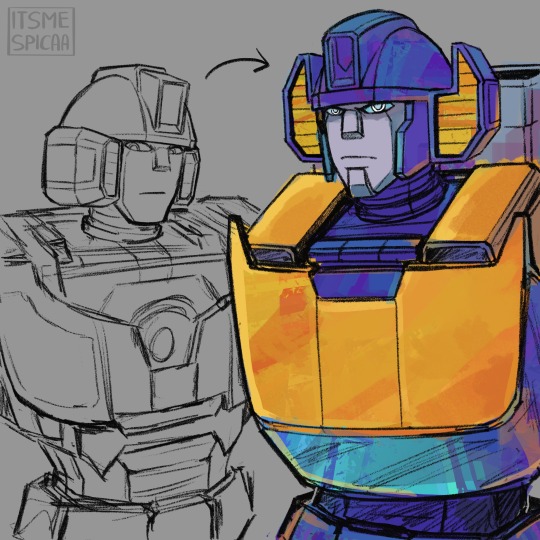
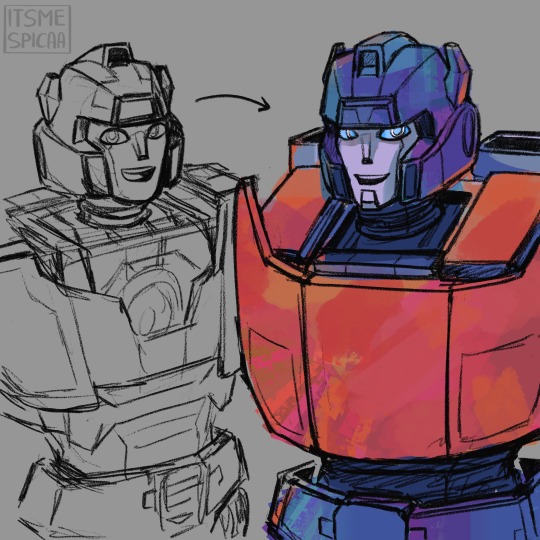
but yea here's my attempt at designing him!! I'm very proud of the helm design, but the chassis....not so much lol. I'll probably replace the window for something more "cybertronian-like", but er (as you can see) I put waaay more thought into his helm ahaha
I wanted to make sure it still reads as a design evolution of his cogless design while still retaining his iconic features (his earfins!!), and most importantly, that it complements SIdeswipe's design as well.
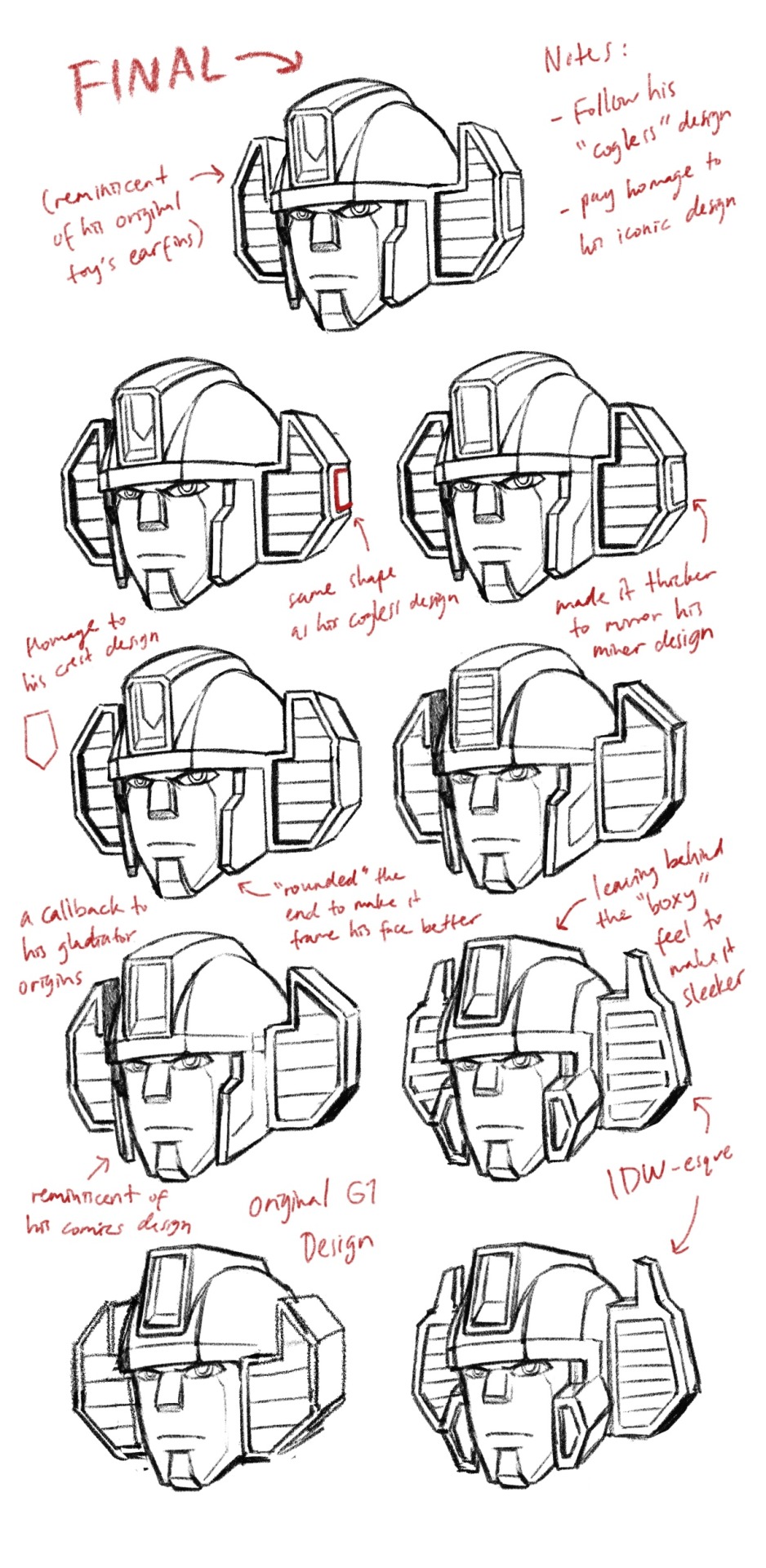
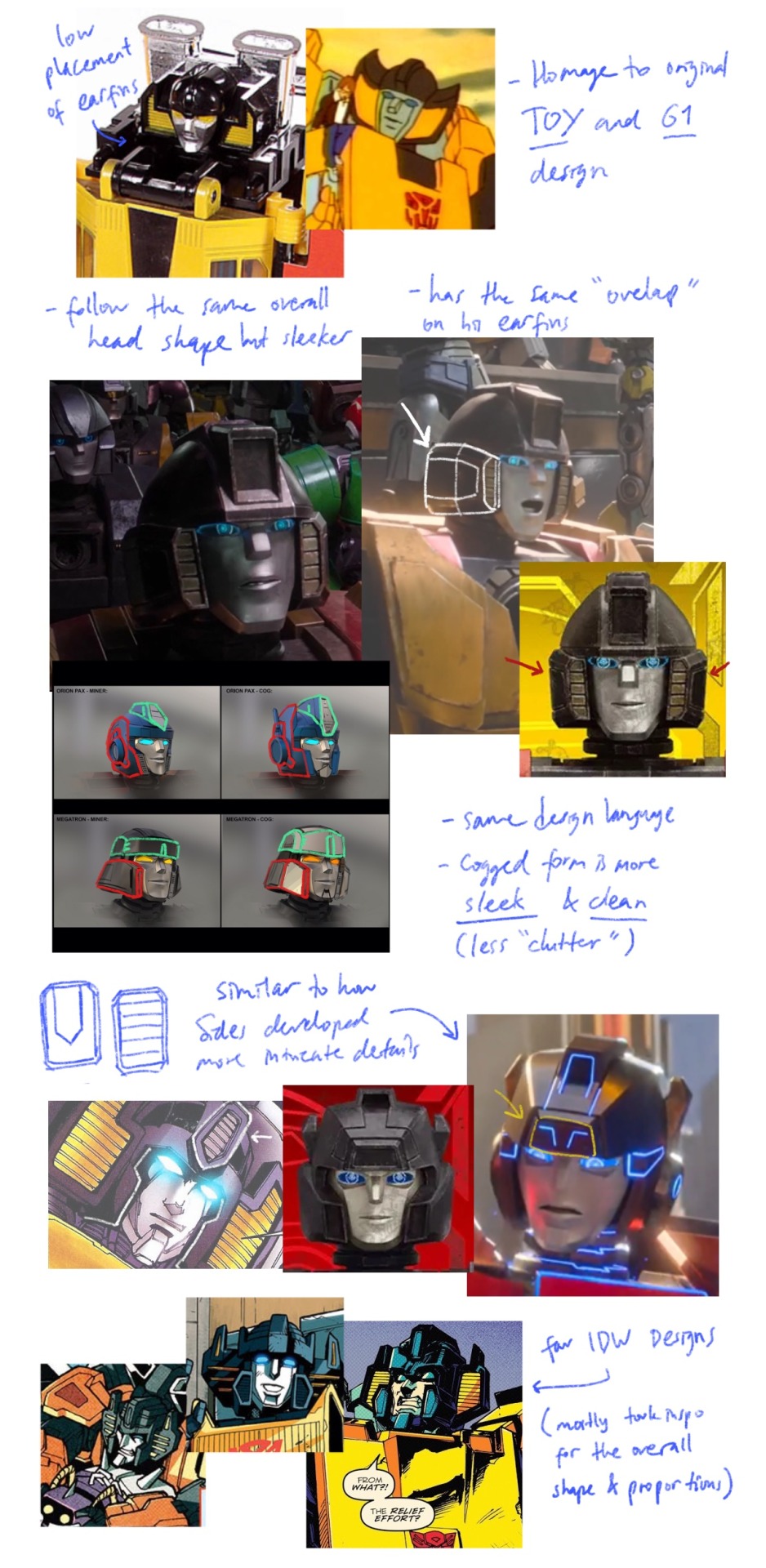
I definitely want to keep the iconic black square/trapezium on the top of his chassis as an homage to his original toy and G1 design, but everything else about his chassis is subject to change :D
as for headcanons...I'm borrowing heavily from his original toy description here: "Tough polymer-steel skin resists artillery" so he'll have a bit more bulk than Sideswipe even though their frames are near-identical and they have the same height.

I just love the idea of Sunny being able to tank more compared to his twin who's more agile. I know this concept isn't foreign because I've read a few fics that alluded to this too so that's nice!
Honestly tho I hope we get to see his actual cogged design in the sequel (PLEASEPLEASEPLEASPLEPLPEAPLS--)....✊😔 here's to manifesting
#sunstreaker#transformers one#maccadam#transformers#if i ever get to designing his chassis i'll just reblog this post/edit it ahaha#also im so happy to see another lambo twins enjoyer 😭💖 hello!!! im glad you like how i draw them!!#more to come hehe#i actually have everything worked out (their personalities relationship dynamic and roles in the war) but it's all in my fic draft so lolol#wanna doodle them at some point#thanks for the question anon!! feel free to ramble to me about the twins :3
159 notes
·
View notes
Text
Double Indemnity, Veritas Ratio and Aventurine

This was originally a part of my compilation post as a short analysis on the Double Indemnity references, linking to this great thread by Manya on Twitter. However, I've recently watched the movie and found that the parallels run much deeper than just the mission name and the light cone itself, plus as the short synopsis I've read online. Since there isn't really an in-depth attempt at an analysis on the film in relation to the way Aventurine and Ratio present themselves throughout Penacony, I thought I'd take a stab at doing just that. I will also be bringing up things from Manya's thread as well as another thread that has some extra points.
Disclaimer that I... don't do analyses very often. Or write, in general — I'm someone who likes to illustrate their thoughts (in the artistic sense) more than write. There's just something about these two that makes me want to rip into them so badly, so here we are. If there's anything you'd like to add or correct me on, feel free to let me know in the replies or reblogs, or asks. This ended up being a rather extensive deep dive into the movie and its influences on the pairing, so please keep that in mind when pressing Read More.
There are two distinct layers on display in Ratio and Aventurine's relationship throughout Penacony, which are references to the two most important relationships in the movie — where they act like they hate/don’t know each other, and where they trust each other.
SPOILER WARNING for the entire movie, by the way. You can watch the film for free here on archive.org, as well as follow along with the screenplay here. I will also be taking dialogue and such from the screenplay, and cite quotes from the original novel in its own dedicated section. SPOILER WARNING for the Cat Among Pigeons Trailblaze mission, as well.

CONTENT WARNING FOR MENTIONS OF SUICIDE. YOU HAVE BEEN WARNED.
To start, Double Indemnity (1944) is a film noir by Billy Wilder (and co-written by Raymond Chandler) based on the novel of the same name by James M. Cain (1927). There are stark differences between the movie adaptation and the original novel which I will get into later on in this post, albeit in a smaller section, as this analysis is mainly focused on the movie adaptation. I will talk about the basics (summaries for the movie and the game, specifically the Penacony mission in tandem with Ratio and Aventurine) before diving into the character and scene parallels, among other things.

—
[THE NAME]
The term "double indemnity" is a clause in which if there’s a case of accidental death of a statistically rare variety, the insurance company has to pay out multiple of the original amount. This excludes deaths by murder, suicide, gross negligence, and natural causes.

The part of the mission in Cat Among Pigeons where Ratio and Aventurine meet with Sunday is named after the movie. And before we get further into things, let's get this part out of the way: The Chinese name used in the mission is the CN title of the movie, so there's no liberties taken with the localization — this makes it clear that it’s a nod to the movie and not localization doing its own thing like with the mission name for Heaven Is A Place On Earth (EN) / This Side of Paradise (人间天堂) (CN).

—
[SUMMARY OF THE 1944 MOVIE]
Here I summarised the important parts that will eventually be relevant in the analysis related to the game.

Insurance salesman Walter Neff, wounded from a gunshot, enters his office and confesses his crime on a dictaphone to his boss Barton Keyes, the claims manager. Much earlier, he had met Phyllis Dietrichson, the wife of Mr. Dietrichson and former nurse. Neff had initially wanted to meet Mr. Dietrichson because of car insurance. Phyllis claims her husband is mean to her and that his life insurance goes to his daughter Lola. With Neff seduced by Phyllis, they eventually brew up a scheme to murder Mr. Dietrichson in such a way that they activate the "double indemnity" clause, and the plan goes off almost perfectly. Initially, the death is labeled a suicide by the president of the company, Norton.
Keyes finds the whole situation suspicious, and starts to suspect Phyllis may have had an accomplice. The label on the death goes from accidental, to suicide, to then murder. When it’s ruled that the husband had no idea of the accidental policy, the company refuses to pay. Neff befriends Phyllis’ stepdaughter Lola, and after finding out Phyllis may have played a part in the death of her father’s previous wife, Neff begins to fear for Lola and himself, as the life insurance would go all towards her, not Phyllis.
After the plan begins to unravel as a witness is found, it comes out that Lola’s boyfriend Nino Zachette has been visiting Phyllis every night after the murder. Neff goes to confront Phyllis, intending to kill her. Phyllis has her own plans, and ends up shooting him, but is unable to fire any more shots once she realises she did love him. Neff kills her in two shots. Soon after telling Zachette not to go inside the house, Neff drives to his office to record the confession. When Keyes arrives, Neff tells him he will go to Mexico, but he collapses before he could get out of the building.
—
[THE PENACONY MISSION TIMELINE]

I won’t be summarising the entirety of Aventurine and Ratio’s endeavours from the beginning of their relationship to their final conversation in Heaven Is A Place On Earth the same way as I summarised the plot of the movie, so I will instead present a timeline. Bolded parts means they are important and have clear parallels, and texts that are in [brackets] and italics stand for the names of either the light cone, or the mission names.
[Final Victor] Their first meeting. Ratio’s ideals are turned on its head as he finally meets his match.
Several missions happen in-between their first encounter and the Penacony project. They come to grow so close and trusting with each other that they can guess, understand each other’s thoughts, way of thinking and minds even in high stakes missions. Enough to pull off the Prisoner’s Dilemma (Aventurine’s E1) and Stag Hunt Game (Aventurine’s E6) and come out on top.
Aventurine turns towards Ratio for assisting him in the Penacony project. Ratio's involvement in the project is implied to be done without the knowledge of Jade, Topaz, and the IPC in general, as he was only sent to Penacony to represent the Intelligentsia Guild, and the two other Stonehearts never mention Ratio.
Aventurine and Ratio cook up the plan to deceive Sunday before ever setting foot on Penacony. Aventurine does not tell Ratio the entirety of his plan.
Aventurine convinces Topaz and Jade to trust him with their Cornerstones. Aventurine also breaks his own Cornerstone and hides it along with the jade within a bag of gift money.
[The Youth Who Chase Dreams] They enter Penacony in the Reverie Hotel. Aventurine is taken to the side by Sunday and has all his valuables taken, which includes the gift money that contains the broken aventurine stone, the jade, and the case containing the topaz.
Aventurine and Ratio speak in a “private” room about how Aventurine messed up the plan. After faking an argument to the all-seeing eyes of Sunday, Ratio leaves in a huff.
Ratio, wearing his alabaster head, is seen around Golden Hour in the (Dusk) Auction House by March 7th.
[Double Indemnity] Ratio meets up with Sunday and “exposes” Aventurine to him. Sunday buys his “betrayal”, and is now in possession of the topaz and jade. Note that this is in truth Ratio betraying Sunday all along.
Ratio meets up with Aventurine again at the bar. Ratio tells Aventurine Sunday wants to see him again.
They go to Dewlight Pavilion and solve a bunch of puzzles to prove their worth to Sunday.
They meet up with Sunday. Sunday forces Aventurine to tell the truth using his Harmony powers. Ratio cannot watch on. It ends with Aventurine taking the gift money with his Cornerstone.
[Heaven Is A Place On Earth] They are in Golden Hour. Ratio tries to pry Aventurine about his plan, but Aventurine reins him in to stop breaking character. Ratio gives him the Mundanite’s Insight before leaving. This is their final conversation before Aventurine’s grandest death.
Now how exactly does the word “double indemnity” relate to their mission in-game? What is their payout? For the IPC, this would be Penacony itself — Aventurine, as the IPC ambassador, handing in the Jade Cornerstone as well as orchestrating a huge show for everybody to witness his death, means the IPC have a reason to reclaim the former prison frontier. As for Ratio, his payout would be information on Penacony’s Stellaron, although whether or not this was actually something he sought out is debatable. And Aventurine? It’s highly implied that he seeks an audience with Diamond, and breaking the Aventurine Cornerstone is a one way trip to getting into hot water with Diamond. With Aventurine’s self-destructive behaviour, however, it would also make sense to say that death would be his potential payout, had he taken that path in the realm of IX.
Compared to the movie, the timeline happens in reverse and opposite in some aspects. I will get into it later. As for the intended parallels, these are pretty clear and cut:
Veritas Ratio - Walter Neff
Aventurine - Phyllis Dietrichson
Sunday - Mr. Dietrichson

There is one other character who I feel also is represented in Ratio, but I won’t bring them up until later down the line.
For the sake of this analysis, I won’t be exploring Sunday’s parallel to Mr. Dietrichson, as there isn’t much on Dietrichson’s character in the first place in both the movie and the novel. He just kind of exists to be a bastard that is killed off at the halfway point. Plus, the analysis is specifically hyper focused on the other two.
—
[SO, WHAT’S THE PLAN?]
To make things less confusing in the long run whenever I mention the words “scheme” and “plan”, I will be going through the details of Phyllis and Neff’s scheme, and Aventurine and Ratio’s plan respectively. Anything that happens after either pair separate from another isn’t going to be included. Written in a way for the plans to have gone perfectly with no outside problems.

Phyllis and Neff —> Mr. Dietrichson
Goal: Activate the double indemnity clause by killing Mr. Dietrichson and making it look like a freak train accident
Payout: Twice or more of the face value of the life insurance ($100,000)
Main Actor: Walter Neff | Accomplice: Phyllis Dietrichson
During the entire time until the payout, Phyllis and Neff have to make sure to any outsiders that they look like complete strangers instead of lovers in an affair.
Step-by-step:
Neff convinces Mr. Dietrichson to sign the policy with the clause without him suspecting foul play, preferably with a third party to act as an alibi. This is done discreetly, making Mr. Dietrichson not read the policy closely and being told to just sign.
Neff and Phyllis talk to each other about small details through the phone (specified to be never at Phyllis’ own house and never when Neff was in his office) and in the marketplace only, to make their meetings look accidental. They shouldn’t be seen nor tracked together, after all.
Phyllis asks Mr. Dietrichson to take the train. She will be the one driving him to the train station.
On the night of the murder, after making sure his alibi is airtight, Neff sneaks into their residence and hides in their car in the second row seating, behind the front row passenger seat. He wears the same colour of clothes as Mr. Dietrichson.
Phyllis and Mr. Dietrichson get inside the car — Phyllis in the driver’s seat and Mr. Dietrichson in the passenger seat. Phyllis drives. On the way to the train station, she makes a detour into an alley. She honks the horn three times.
After the third honk, Neff breaks Mr. Dietrichson’s neck. The body is then hidden in the second row seating under a rug.
They drive to the train station. Phyllis helps Neff, now posing as Mr. Dietrichson, onto the train. The train leaves the station.
Neff makes it to the observation platform of the parlour car and drops onto the train tracks when nobody else is there.
Phyllis is at the dump beside the tracks. She makes the car blink twice as a signal.
The two drag Mr. Dietrichson’s corpse onto the tracks.
They leave.
When Phyllis eventually gets questioned by the insurance company, she pretends she has no idea what they are talking about and eventually storms off.
Phyllis and Neff continue to lay low until the insurance company pays out.
Profit!
Actual Result: The actual murder plan goes almost smoothly, with a bonus of Mr. Dietrichson having broken a leg. But with him not filing a claim for the broken leg, a witness at the observation platform, and Zachette visiting Phyllis every night after the murder, Keyes works out the murder scheme on his own, but pins the blame on Phyllis and Zachette, not Neff.

Now for Aventurine and Ratio. You can skip this section if you understand how deep their act goes, but to those who need a refresher, here’s a thorough explanation:
Aventurine and Ratio —> Sunday
Goal: Collect the aventurine stone without Sunday knowing, ruin the dream (and create the grandest death)
Payout: Penacony for the IPC, information on the Stellaron for Ratio, a meeting with Diamond / death for Aventurine
Main Actor: Aventurine | Accomplice: Veritas Ratio
From the moment they step onto Penacony, they are under Sunday’s ever present and watchful eyes. “Privacy” is a foreign word to The Family. They have to act like they don’t like each other’s company the entire time and feed Sunday information through indirect means so that the eventual “betrayal” by Ratio seems truthful to Sunday. Despite what it looks like, they are closer than one would ever think, and Ratio would never sell out a person purely for information.
Step-by-step:
After Sunday takes away the bag of gift money and box, Aventurine and Ratio talk in a room in the Reverie Hotel.
Aventurine establishes the Cornerstones’ importance, and how he lost the gift money and the case containing the Cornerstones to Sunday. Ratio turns to leave, saying “some idiot ruined everything”, meaning the Cornerstones were vital to their plan. (Note that Ratio is not wearing his alabaster head while saying it to said “idiot”.)
Aventurine then proceeds to downplay the importance of the Cornerstones, stating they are “nothing more than a few rocks” and “who cares if they are gone”. This lets Sunday know that something suspicious may be going on for him to act like it’s nothing, and the mention of multiple stones, and leaves him to look up what a Cornerstone is to the Ten Stonehearts of the IPC.
Ratio points out his absurd choice of outfit, mentioning the Attini Peacock and their song.
Ratio implies that without the aventurine stone, he is useless to the IPC. He also establishes that Aventurine is from Sigonia(-IV), and points out the mark on his neck. To Sunday, this means that Aventurine is shackled to the IPC, and how Aventurine may possibly go through extreme lengths to get the stone back, because a death sentence always looms above him.
Aventurine claims Ratio had done his homework on his background, which can be taken that this is their very first time working together. (It isn’t, and it only takes one look to know that Aventurine is an Avgin because of his unique eyes, so this comment does not make sense even in a “sincere” way, a running theme for the interaction.)
Ratio mentions how the true goal is to reclaim Penacony for the IPC, establishing their ulterior motive for attending the banquet.
Ratio asks if Aventurine went to pre-school in Sigonia after saying trust was reliant on cooperation. Aventurine mentions how he didn’t go to school and how he doesn’t have any parents. He even brings up how friends are weapons of the Avgins. This tells Sunday that the Avgins supposedly are good at manipulation and potentially sees Ratio possibly betraying Aventurine due to his carelessness with his “friends”. Sunday would also then research about the Avgins in general (and research about Sigonia-IV comes straight from the Intelligentsia Guild.)
Ratio goes to Dewlight Pavilion in Sunday’s Mansion and exposes a part of Aventurine’s “plan”. When being handed the suitcase, Ratio opens it up due to his apparent high status in the IPC. He tells Sunday that the Cornerstone in the suitcase is a topaz, not an aventurine, and that the real aventurine stone is in the bag of gift money. This is a double betrayal — on Aventurine (who knows) and Sunday (who doesn’t). Note that while Ratio is not officially an IPC member in name — the Intelligentsia Guild (which is run by the IPC head of the Technology Department Yabuli) frequently collaborates with the IPC. Either Aventurine had given him access to the box, or Ratio’s status in general is ambiguous enough for Sunday not to question him further. He then explains parts of Aventurine’s gamble to Sunday in order to sell the betrayal. Note that Ratio does not ever mention Aventurine’s race to Sunday.
Ratio brings Aventurine to Sunday. Aventurine offers help in the investigation of Robin's death, requesting the gift money and the box in return.
Sunday objects to the trade offer. Aventurine then asks for just the bag. A classic car insurance sales tactic. Sunday then interrogates Aventurine, and uses everything Ratio and Aventurine brought up in the Reverie Hotel conversation and their interactions in the Mansion, as well as aspects that Ratio had brought up to Sunday himself.
Aventurine feigns defeat and ignorance enough so that Sunday willingly lets him go with the gift bag. After all is said and done, Aventurine leaves with the gift money, where the Aventurine Cornerstone is stored all along.
Ratio and Aventurine continue to pretend they dislike each other until they go their separate ways for their respective goals and plans. Aventurine would go on to orchestrate his own demise at the hands of Acheron, and Ratio… lurks in the shadows like the owl he is.
Profit!
Actual Result: The plan goes perfectly, even with minor hiccups like Ratio coming close to breaking character several times and Aventurine being sentenced to execution by Sunday.
This is how Sunday uses the information he gathered against Aventurine:
• Sunday going on a tirade about the way Aventurine dresses and how he’s not one to take risks — Ratio’s comment about Aventurine’s outfit being peacock-esque and how he’s “short of a feather or two”. • “Do you own a Cornerstone?” — Ratio talked about the aventurine stone. • “Did you hand over the Cornerstone to The Family when you entered Penacony?” — Aventurine mentioned the box containing the Cornerstones. • “Does the Cornerstone you handed over to The Family belong to you?” — Aventurine specifically pluralized the word Cornerstone and “a bunch of rocks” when talking to Ratio. • “Is your Cornerstone in this room right now?” — The box in the room supposedly contained Aventurine’s own cornerstone, when Aventurine mentioned multiple stones. • “Are you an Avgin from Sigonia?” —Aventurine mentioned that he’s an Avgin, and Ratio brought up Sigonia. • “Do the Avgins have any ability to read, control, and manipulate one’s own or another’s minds?” — Aventurine’s comment on how friends are weapons, as well as Sunday’s own research on the Avgins, leading him to find out about the negative stereotypes associated with them. • “Do you love your family more than yourself?” — His lost parents. “All the Avgins were killed in a massacre. Am I right?” — Based on Sunday’s research into his background. • “Are you your clan’s sole survivor?” — Same as the last point. “Do you hate and wish to destroy this world with your own hands?” — Ratio mentioned the IPC’s goal to regain Penacony, and Aventurine’s whole shtick is “all or nothing”. • “Can you swear that at this very moment, the aventurine stone is safe and sound in this box?” — Repeat.
As seen here, both duos have convoluted plans that involve the deception of one or more parties while also pretending that the relationship between each other isn’t as close as in reality. Unless you knew both of them personally and their histories, there was no way you could tell that they have something else going on.
On to the next point: Comparing Aventurine and Ratio with Phyllis and Neff.
—
[NEFF & PHYLLIS — RATIO & AVENTURINE]

With the short summaries of the movie and the mission out of the way, let’s look at Phyllis and Neff as characters and how Aventurine and Ratio are similar or opposite to them.

Starting off with Aventurine and Phyllis. Here is where they are the most similar:
Phyllis is blonde and described as a provocative woman. Aventurine is also a blond and eyes Ratio provocatively in the Final Victor light cone.
Phyllis was put under surveillance after Keyes starts figuring out that the so-called accidental death/suicide may have been a murder after all. Similarly, Aventurine was watched by Sunday the entire time in Penacony.
Phyllis never tells Neff how she's seeing another man on the side to possibly kill him too (as well as how she was responsible for the death of her husband‘s previous wife). Aventurine also didn't tell Ratio the entirety of his plan of his own death.
Phyllis puts on a somewhat helpless act at first but is incredibly capable of making things go her way, having everything seemingly wrapped around her finger. Aventurine — even when putting on a facade that masks his true motives — always comes out at the top.
Now the differences between Aventurine and Phyllis:
Phyllis does not care about her family and has no issue with killing her husband, his previous wife, and possibly her daughter Lola. Opposite of that, Aventurine is a family man… with no family left, as well as feeling an insane level of survivor’s guilt.
Really, Phyllis just… does not care at all about anyone but herself and the money. Aventurine, while he uses every trick in the book to get out on top, does care about the way Jade and Topaz had entrusted him with their Cornerstones, in spite of the stones being worth their lives.
Phyllis also uses other people to her advantage to get what she wants, often behind other people's backs, with the way she treats Neff and Zachette. Aventurine does as well (what with him making deals with the Trailblazer while also making a deal with Black Swan that involves the Trailblazer). The difference here is Phyllis uses her allure deliberately to seduce men while Aventurine simply uses others as pawns while also allowing others to do the same to himself.
Phyllis makes no attempt at compromising the policy when questioned by Norton. Aventurine ends up compromising by only taking the gift money (which is exactly what he needs).
The wig that Barbara Stanwyck (the actress of Phyllis) wore was chosen to make her look as “sleazy” as possible, make her look insincere and a fraud, a manipulator. A sort of cheapness. Aventurine’s flashy peacock-esque outfit can be sort of seen as something similar, except the outfit isn’t cheap.

Moving on to Ratio’s similarities to Neff… There isn’t much to extrapolate here as Ratio is more of a side character in the grand scheme of Penacony, however this is what I’ve figured out.
Neff has dark hair. Ratio has dark purple hair.
Neff almost never refers to Phyllis by her name when speaking with her, only as “baby”. The few times he refers to her as Phyllis or Mrs. Dietrichson is during their first conversations and when he has to act like he doesn’t know her. Ratio never calls Aventurine by his name when he’s around him — only as “gambler”, sometimes “damned” or “dear” (EN-only) gambler. Only in the Aventurine's Keeping Up With Star Rail episode does Ratio repeatedly say his name, and yet he still calls him by monikers like “gambler” or, bafflingly, a “system of chaos devoid of logic”.
Both Neff and Ratio committed two betrayals: Neff on Mr. Dietrichson and Keyes, and Ratio on Sunday and Aventurine. With the former cases it was to reach the end of the trolley line, and with the latter it was on a man who had put his trust in him.
As for the differences…
Neff is described as someone who’s not smart by his peers. Ratio is someone who is repeatedly idolised and put on a pedestal by other people.
Neff is excellent at pretending to not know nor care for Phyllis whenever he speaks about her with Keyes or when he and she are in a place that could land them in hot water (the office, the mansion when there are witnesses). His acting is on the same level as Phyllis. With Ratio it’s… complicated. While he does pull off the hater act well, he straight up isn’t great at pretending not to care about Aventurine’s wellbeing.
Instead of getting his gunshot wound treated in the hospital like a normal person, Neff makes the absolutely brilliant decision of driving to his office and talking to a dictaphone for hours. Needless to say, this is something a medical doctor like Ratio would never do.

Now here's the thing. Though it's very easy to just look at Phyllis and Neff in the movie and go "okay, Aventurine is Phyllis and Ratio is Neff — end of story" and leave it at that, I find that they both take from the two leads in different ways. Let me explain. Beginning with Aventurine and Neff…
Neff is the one who hatches the plan and encourages Phyllis to go through and claim the double indemnity clause in the first place. He is also the key player of his own risky plan, having to fake being the husband to enter the train as well as fake the death. Aventurine puts himself at great risk just by being in Sunday’s presence, and hoping that Sunday wouldn’t figure out that the green stone he had uncovered wasn’t the aventurine stone.
Adding onto the last point, Neff had fantasised about pulling off the perfect murder for a long time — the catalyst was simply him meeting Phyllis. Aventurine presumably sought out Ratio alone for his plan against Sunday.
Neff makes a roulette wheel analogy and talks about a pile of blue and yellow poker chips (the latter in the script only). I don‘t even have to explain why this is relevant here. (Aventurine’s Ultimate features a roulette wheel and the motif is on his belt, thigh strap, and back, too. And of course, Aventurine is all about his chips.)
Neff has certain ways to hide when he’s nervous, which include hiding his hands in his pockets when they were shaking, putting on glasses so people couldn’t see his eyes. Aventurine hides his left hand behind his back when he’s nervous: Future Aventurine says that "they don't know the other hand is below the table, clutching [his] chips for dear life", and in multiple occasions such as the Final Victor LC, his character trailer, and even in his boss form in the overworld you can see that Aventurine hides his left hand behind his back. And he is also seen with his glasses on sometimes.
Neff says a bunch of stuff to make sure that Phyllis acts her part and does not act out of character (i.e. during their interactions at the market), like how Aventurine repeatedly tries to get Ratio back on track from his subpar acting.
Neff is always one step ahead of the game, and the only reason the plan blows up in his face is due to outside forces that he could not have foreseen (a witness, Keyes figuring out the plan, the broken leg). Aventurine meanwhile plays 5D chess and even with the odds against him, he uses everything he can to come out on the top (i. e. getting Acheron to kill him in the dream).
Even after coming home on the night of the murder, Neff still felt that everything could have gone wrong. Aventurine, with his blessed luck, occasionally wavers and fears everything could go wrong whenever he takes a gamble.
Neff was not put under surveillance by Keyes due to him being extensive with his alibi. After witnessing Robin’s death with eyewitnesses at the scene, the Family had accepted Aventurine’s alibi, though he would be under watch from the Bloodhounds according to Ratio.
Neff talks about the entire murder scheme to the dictaphone. Aventurine during Cat Among Pigeons also retells his plan, albeit in a more convoluted manner, what with his future self and all.

Continuing with Ratio and Phyllis, even with their personalities and motivations being quite different, they do have a few commonalities.
Phyllis was a nurse. Ratio is a medical doctor.
Her name is Greek of origin. Veritas Ratio, though his name is Latin, has Greco-Roman influences throughout his entire character.
The very first scene Phyllis appears in has her wearing a bath towel around her torso. Ratio loves to take baths to clear his mind.
Phyllis was instructed by Neff to be at the market every morning at eleven buying things. Ratio is seen in an auction house with his alabaster head on so no one could recognize him.
Phyllis mostly acts as an accomplice to the scheme, being the one to convince her husband to take the train instead. She is also generally seen only when Neff is involved. Ratio plays the same role as well, only really appearing in the story in relation to Aventurine as well as being the accomplice in Aventurine’s own death. Even him standing in the auction house randomly can be explained by the theory that he and Aventurine had attempted to destabilise Penacony’s economy through a pump and dump scheme.
With these pointers out of the way, let’s take a closer look at select scenes from the film and their relation to the mission and the pair.
—
[THE PHONE CALL — THE REVERIE HOTEL]

Before the murder, there is a scene with a phone call between Phyllis and Neff discussing the plan while Keyes is in the same room as Neff. Neff has to make sure that Keyes doesn’t think of anything of the phone call, so he acts like he’s calling a “Margie”, and says a bunch of stuff that sounds innocent out of context (“Can’t I call you back, ‘Margie’?” “What color did you pick out?” “Navy blue. I like that fine”), but are actually hinting at the real plan all along (the suit that Mr. Dietrichson wears.)
In a roundabout way, the conversation between Ratio and Aventurine in the Reverie Hotel can be seen as the opposite of that scene — with the two talking about their supposed plan out loud on Penacony ground, a place where the Family (and in turn, Sunday) has eyes everywhere. Despite being in a “private” room, they still act like they hate each other while airing out details that really do not make sense to air out if they really did meet the first time in Penacony (which they didn’t — they’ve been on several missions beforehand). It’s almost like they want a secret third person to know what they were doing, instead of trying to be hushed up about it. The TVs in the room that Sunday can look through based on Inherently Unjust Destiny — A Moment Among The Stars, the Bloodhound statue that disappears upon being inspected, the owl clock on the left which side eyes Ratio and Aventurine, all point to that Sunday is watching their every move, listening to every word.
Rewinding back to before the phone call, in one of the encounters at the marketplace where they “accidentally” run into each other, Phyllis talks about how the trip was off. How her husband wouldn’t get on the train, which was vital for their plan, because of a broken leg. All this, while pretending to be strangers by the passersby. You could say that the part where Ratio almost leaves because Aventurine had “ruined the plan” is the opposite of this, as the husband breaking his leg was something they couldn’t account for, while Aventurine “being short of a few feathers” was entirely part of the plan.
—
[QUESTIONING PHYLLIS — THE INTERROGATION]

This section is going to be a little longer as I will cover two scenes in the movie in a more detailed manner — Mr. Dietrichson signing the policy, and Phyllis being questioned — and how they are represented in the Sunday-Aventurine interrogation and the prior conversation between Ratio and Sunday in multitudes of ways.
Going about their plan, Neff has to make sure that Mr. Dietrichson signs the policy with the double indemnity clause without him knowing the details, all the while having Phyllis (and Lola) in the same room. He and Phyllis have to pretend that they don’t know each other, and that this is just the standard accidental insurance process, instead of signing what would be his downfall. To sell it, he gets Mr. Dietrichson to sign two “copies” of the form, except with Mr. Dietrichson’s second signature, he’s duped into signing the accident insurance policy with the respective clause.
You can tie this to how Ratio goes to Sunday in order to “expose” the lie that the suitcase didn’t actually contain the Aventurine Cornerstone, as well as there being more than one Cornerstone involved in the scheme. Ratio must make sure that Sunday truly believes that he dislikes Aventurine’s company, while also making sure that Sunday doesn’t figure out the actual aventurine stone is broken and hidden in the gift bag. The scheme turns out to be successful, as Sunday retrieves the two Cornerstones, but not the aventurine stone, and truly does think that the green stone he has in his possession is the aventurine.

This whole scene with Sunday is also reminiscent of the interrogation scene in the middle of the movie, where Phyllis was questioned by the boss (Norton) who was deducing that Mr. Dietrichson's death was a suicide, not accidental death. Neff, Phyllis, Keyes and Norton were all in the same room, and Neff and Phyllis had to act like they never knew the other. Phyllis acts like she knows nothing about what Norton insinuates about her husband and eventually, Phyllis explodes in anger and storms out the room, even slamming the door. Her act is very believable to any outsider.

Now back to the Ratio and Sunday conversation. One glaring difference between the movie and here is that his acting isn’t great compared to either Phyllis nor Neff. It never was throughout the Penacony mission. He even comes very close to breaking character several times, and is even defending Aventurine in a somewhat aggressive manner during his one-on-one conversation with Sunday, as in he literally tells Sunday to see a shrink. It’s very different from the way he was acting in Herta Space Station — like Ratio cares about Aventurine too much to keep his hands off.
It's also worth pointing out that Neff doesn't speak a word when Phyllis was being interrogated. Similarly, Ratio is silent throughout the entire scene with Sunday and Aventurine, with his only “line” being a “hm”. When Aventurine calls him a wretch to his face, all he does is look to the side. In fact, he can only look at Aventurine when the other isn’t staring back. Almost like him uttering a single word would give them away. Or his acting is terrible when it has to do with Aventurine, as he has no issue doing the same thing in Crown of the Mundane and Divine (Mundane Troubles).
So, Sunday finds out about the Cornerstones and reveals them to Aventurine, and reasons that he cannot give them back to him because Aventurine had lied. Note that in that same scene, Aventurine attempted to use the two murders that had occurred beforehand against Sunday to retrieve his own cornerstone. Similarly, when it was revealed that Mr. Dietrichson did not know about the accident policy and that the so-called “accidental death” was not, in fact, accidental, the insurance company refused to pay out the money.
Unlike the movie, this was all planned, however. The double-crossing by Ratio, the gift money being the only thing required for Aventurine’s real plan. All of it was an act of betrayal against Sunday, in the same manner as the meticulous planning as Mr. Dietrichson’s murder — To sign the policy, get him to take the train, kill him on the way, and to have Neff pose as the husband on the train until the time is right to get off and lay the body on the tracks. A key difference is that they could not have expected their scheme to be busted wide open due to forces outside of their control, while Ratio and Aventurine went straight down the line for the both of them no matter what.
From here on out, we can conclude that the way Ratio and Aventurine present themselves in Penacony to onlookers is in line with Neff and Phyllis.
—
[“GOODBYE, BABY” — FINAL VICTOR]

And now for the (in)famous light cone, Final Victor. The thing that truly kickstarted the Ratio and Aventurine ship in the fanbase, and the partnership between the two in general. It’s a direct reference to the final confrontation between Neff and Phyllis in the movie.
I’ll fire through all the similarities between the two scenes.
During the respective scenes, Aventurine and Phyllis both outsmart their partner one way or the other: Aventurine with his one-sided game of Russian Roulette, and Phyllis hiding her gun underneath the cushions until Neff turned away.
The guns are owned by Phyllis and Aventurine, not Neff and Ratio.
Phyllis couldn’t bring herself to fire any more shots after she realised she truly did love Neff. Ratio could do nothing but watch as Aventurine did what he did — he couldn’t even pull away if the LC animation is anything to go by him struggling as Aventurine firmly keeps the gun to his chest.
Neff says he doesn’t buy (believe) that Phyllis loved him. She then goes “I’m not asking you to buy […]”. The LC description has Aventurine ask Ratio “You don’t believe me?”, while in the LC animation Ratio straight up says “You expect me to believe you?” and Aventurine answering “Why not, doctor/professor?”
The visual composition of the LC and the scene are nearly identical, from the lighting to the posing to the way Aventurine looks at Ratio — Aventurine and Ratio are even wearing different outfits to fit the scene better. The background in the LC is also like the blinders in the movie, just horizontal.
In the shot where Phyllis’ face is more visible, the way she looks at Neff is strikingly like the way provocatively looks at Ratio. Even their eyes have a visible shine — Phyllis’ eyes brightly shining the moment she realised she really fell in love with Neff, and Aventurine having just a little light return to his eyes in that specific moment.
And now the differences!
Neff holds the gun in his right hand. Aventurine makes Ratio hold his gun in his left.
Neff is the one who takes the gun from Phyllis‘ hand. Aventurine is the one who places the gun in Ratio’s hand and fires it.
Three gunshots are fired. In the movie, Phyllis shoots the first shot and Neff the second and third. Aventurine unloads the gun and leaves only one bullet for this game of Russian Roulette. He pulls the trigger three times, but they all turn out to be blanks.
Phyllis does not break her façade of not smiling until the very last moment where she gets shot. Aventurine is smiling the entire time according to the light cone description, whilst in the animation, it’s only when he guides the gun to his chest that he puts it on.
So, you know how Neff meets Phyllis and it all goes off the rails from there. The way Neff goes from a decent guy to willingly involve himself in a murder scheme, having his morals corrupted by Phyllis. His world having been turned upside down the moment he lays eyes on Phyllis in that first meeting. Doesn’t that sound like something that happened with the Final Victor LC? Ratio, a man all about logic and rationality — a scholar with eight PhDs to his name — all of that is flipped on its head the moment Aventurine pulls out his gun in their first meeting and forces Ratio to play a game of Russian roulette with him. Aventurine casually gambles using his own life like it’s nothing and seemingly without fear (barring his hidden left hand). All or nothing — and yet Aventurine comes out alive after three blanks. Poetic, considering there’s a consumable in the game called “All or Nothing” which features a broken chess piece and a poker chip bound together by a tie. The poker chip obviously represents the gambler, but the chess piece specifically stands for Ratio because he plays chess in his character trailer, his Keeping Up With Star Rail episode and his introduction is centred around him playing chess with himself. Plus, the design of the chess piece has golden accents, similar to his own chess set. In the end, Aventurine will always be the final victor.
Furthermore, Neff had deduced that Phyllis wanted to kill her husband and initially wanted no part in it, but in a subsequent visit it was his own idea that they trigger the double indemnity clause for more money. As the movie progresses though, he starts to have his doubts (thanks in part to him befriending Lola) and makes the move to kill Phyllis when everything starts to come to light. It’s strikingly similar to how Ratio initially wanted no part in whatever Aventurine had in mind when they first met, but in the subsequent missions where they were paired up, he willingly goes along with Aventurine's risky plans, and they come to trust each other. Enough so that Aventurine and Ratio can go to Penacony all on their own and put on an act, knowing that nobody in the IPC other than them can enter the Dreamscape. The mutual respect grew over time, instead of burning passionately before quickly fizzling out like in the movie.
Basically, in one scene, three shots (blanks) start a relationship, and in the other, it ends a relationship. In the anan magazine interview with Aventurine, he says himself that “form[ing] an alliance with just one bullet” with Ratio was one of his personal achievements. The moment itself was so impactful for both parties that it was immortalised and turned into a light cone.
—
[THE ENDING — GOLDEN HOUR]

The ending of Double Indemnity that made it into the final cut has Neff continue his confession on the dictaphone until he realised that he wasn’t alone in the room. Keyes had come inside at some point, but none had said a thing, only listening to a dead man speak of his crime. When Neff sees Keyes, they talk for a moment, Neff says he plans on fleeing to Mexico. Keyes does not think he will make it. He tries to leave, only to collapse at the front of the elevator, Keyes following just behind him. Neff attempts to light a cigar but is too weak to do so, so Keyes does it for him.
Parts of the ending can still be attributed to the interrogation scene between Sunday and Aventurine, so I’ll make this quick before moving on to the conversation in Heaven Is A Place On Earth, Ratio and Aventurine’s final conversation together. Once Sunday mentions how quickly Aventurine gave up the suitcase, he inflicts the Harmony’s consecration on him, which forces Aventurine to confess everything that Sunday asks of. In a way, it’s the opposite of what happens in the movie — where Neff willingly tells the truth about the murder to his coworker. Aventurine does not like Sunday, and Neff is close to Keyes. Ratio also does not speak, similarly to how Keyes didn’t speak and stood silently off to the side.
Post-interrogation in Golden Hour, Ratio worriedly prods at Aventurine and asks him about his plan. He then gives him the Mundanite’s Insight with the Doctor’s Advice inside when Aventurine tells him to leave. Throughout Heaven Is A Place On Earth, Aventurine gets weaker and his head starts to buzz, until he falls to the ground before he can hand in the final gems. Similarly, Neff progressively grows weaker as he records his confession. Keyes says he’s going to call a doctor and Neff says he’s planning to go to Mexico. And when Neff collapses near the elevator, they talk one final time and Keyes lights Neff’s cigar as the other was too weak to do so himself.

—
[OPPOSITE TIMELINES AND DEVELOPMENTS]
Remember how I said the way certain events happen in the movie and the game are mostly opposite and reverse of one another?
The Final Victor LC is the first meeting of Ratio and Aventurine, and Neff killing Phyllis is their final meeting.
Between that first and last meeting between Phyllis and Neff’s whirlwind romance, their relationship becomes strained which ultimately leads to Neff not trusting whatever Phyllis has to say at the end point of the movie. As for Ratio and Aventurine, the exact opposite had happened, to the point where Ratio trusts Aventurine enough to go along with his plans even if they went against his own ideals. The basis of the mission involved Veritas Ratio, whose full name includes the Latin word for “truth”, lying the entire time on Penacony.
Aventurine is sentenced to the gallows by Sunday after his unwilling interrogation. The movie starts and ends with Neff willingly confessing everything to Keyes.
It bears repeating, but I have to make it so clear that the trust between Ratio and Aventurine runs incredibly deep. Being able to predict what your partner says and thinks and plans in a mission as critical as the Penacony project is not something first-time co-workers can pull off flawlessly. All the while having to put on masks that prevent you from speaking sincerely towards one another lest you rat yourselves out. You have no way of contacting outside reinforcements from within Penacony, as the rest of the IPC are barred from entering. To be able to play everybody for fools while said fools believe you yourselves have handed your case on a silver platter requires a lot — trust, knowledge of the other, past experience, and so on. With Phyllis and Neff, the trust they had had been snuffed out when Neff grew closer to Lola and found out what kind of person Phyllis truly was on the inside. Phyllis did not trust nor love Neff enough and was going behind his back to meet with Zachette to possibly take Neff and Lola out. And the whole reason Neff wanted to perpetrate the murder was due to him being initially taken by Phyllis' appearance, which single handedly got the ball rolling on the crime.
Now then, how come trust is one of the defining aspects of Aventurine and Ratio’s relationship, when Phyllis and Neff’s trust eventually lead to both their deaths at the hands of the other? Sure, this can be explained away with the opposite theory, but there’s one other relationship involving Neff which I haven’t brought up in excruciating detail yet. The other side of Ratio and Aventurine’s relationship.
—
[NEFF & KEYES — AVENTURINE & RATIO]

Here is where it gets more interesting — while Phyllis and Neff are at the centre point of the movie, there is another character to whom Neff has a close relationship with — Keyes. It’s also the only relationship with no pretences, at least, until the whole murder thing happened and Neff had to hide his involvement from Keyes. Watching the movie, I couldn't help but feel there was something more to the two than meets the eye. I knew that queer readings of the film existed, but I didn't think too much of them until now. And though Aventurine and Ratio parallel Phyllis and Neff respectively, the fact that they also have traits of their opposite means that it wouldn’t be completely out of the question if parts of their relationship were also influenced by Keyes and Neff on a deeper and personal level. Let me explain.
Keyes and Neff were intimate friends for eleven years and have shown mutual respect and trust towards one another. They understood each other on a level not seen with Phyllis and Neff. Even after hearing Neff confess his crimes through the dictaphone (and eventually standing in the same room while Neff confessed), he still cared for the other man, and stayed with him when Neff collapsed at the front door. The only reason Keyes hadn’t deduced that it was Neff who was behind the murder was because he had his absolute trust in him. Keyes is also Neff’s boss, and they are always seen exchanging playful banter when they are on screen together. Neff even says the words “I love you, too” twice in the movie — first at the beginning and second at the end, as the final line. There’s also the persistent theme of Neff lighting Keyes’ cigarettes (which happens in every scene where they are face-to-face), except in the end where it’s Keyes who lights Neff’s.
Doesn’t that sound familiar? Mutual respect, caring too much about the other person, the immense amount of trust… Ratio says he’s even the manager of the Penacony project (which may or may not be a lie), and despite their banter being laced with them acting as “enemies”, you can tell that in Dewlight Pavilion pre-Sunday confrontation that Aventurine genuinely likes Ratio’s company and believes him to be a reliable person. From the way he acts carefree in his words to the thoughts in his head, as seen in the mission descriptions for Double Indemnity. Their interactions in that specific mission are possibly the closest thing to their normal way of speaking that we get to see on Penacony.

Not to mention, this is the way Neff describes Keyes. He even says (not in the script) “you never fooled me with your song and dance, not for a second.” Apart from the line about the cigar ashes, doesn’t this ring a bell to a certain doctor? “Jerk” with a heart of gold?

After solving the puzzle with the statues, Ratio jokingly offers Aventurine to join the Genius Society. Aventurine then goes "Really? I thought you’ve given up on that already", and then Ratio says it was, in fact, a joke. Solving the puzzle through brute force has Ratio telling Aventurine that the Council of Mundanites (which Ratio himself is a part of) should consider him a member. In the movie, where the scene with the phone call with Neff and Phyllis reiterating details of their plan happens, Keyes actually offered Neff a better job (specifically a desk job, as Keyes’ assistant). The two pairs saw the other as smart, equals, and were invested in each other’s careers one way or another.

Because of all this, the character parallels for this side of the relationship are as follows:
Aventurine - Walter Neff
Veritas Ratio - Barton Keyes
With the way I’ve talked about how Aventurine and Ratio take from both leads in terms, it does fit to say that Aventurine is Neff, and Ratio is Keyes in this layer of their relationship. Since we’re on the topic of Keyes, let me also go through some similarities with him and Ratio specifically.
Keyes says the words “dimwitted amateurs” in his first on-screen conversation with Neff. You can’t have Dr. Ratio without him talking about idiocy in some way.
Keyes almost only appears in the movie in relation to Neff, and barring a single interaction in Neff’s house, is also only seen in the office. Same with Phyllis, Ratio also only ever appears regarding Aventurine.
Keyes genuinely wanted the best for Neff, even offering to celebrate with him when he thought the case truly had been busted wide open by forces when Zachette entered the picture. You could say the same for Ratio, as he hoped that Aventurine wouldn’t dwell on the past according to his response on Aventurine’s Interview, as well as telling him to “stay alive/live on (CN)” and wishing him the best of luck in his Doctor’s Advice note.
Whether or not you believe that there was more going on with Neff and Keyes is up to you, but what matters is that the two were very close. Just like Ratio and Aventurine.
—
[THE ORIGINAL FILM ENDING]
Something that I hadn’t seen brought up is the original ending of Double Indemnity, where Neff is executed in a gas chamber while Keyes watches on, shocked, and afterwards leaves somberly. The ending was taken out because they were worried about the Hays Code, but I felt it was important to bring it up, because in a way, you can kind of see the Sunday interrogation scene as Sunday sending Aventurine to his death in seventeen system hours. And Ratio doesn’t speak at all in that scene, and Keyes doesn’t either according to the script.
Another thing that’s noteworthy is that Wilder himself said “the story was about the two guys” in Conversations with Wilder. The two guys in question are Keyes and Neff.

—
[THE NOVEL]

With the original film ending covered, now it is time to bring up the novel by James M. Cain. I bought the book just to read about the differences between the adaptation and the original source material, and to list a few more similarities and opposites I could gather. For this section alone, due to the changes in the (last) names of certain characters, I will be referring to Walter Huff (Neff in the movie) as Walter, and Mr. Dietrichson as Nirdlinger. The plot is pretty much the same as the movie’s apart from a couple of changes so there isn’t a need to recount everything.
From my two read-throughs of the novel, these are the following passages that stood out to me the most. Starting with Aventurine:
Walter, as a top businessman of the company, knows how to sway a deal and to get what he truly wants with what the other gives him. Aventurine is the same, reliant on his intuition, experience and whatever information he has on the table to claim the win. Him luring out Sparkle in Heaven Is A Place On Earth and his conversation with Acheron in the Nihility is indicative of that.
• "But you sell as many people as I do, you don't go by what they say. You feel it, how the deal is going. And after a while I knew this woman didn't care anything about the Automobile Club. Maybe the husband did, but she didn't. There was something else, and this was nothing but a stall. I figured it would be some kind of a proposition to split the commission, maybe so she could get a ten-spot out of it without the husband knowing. There's plenty of that going on. And I was just wondering what I would say to her."
Phyllis, like in the movie, had been hiding her true intentions of talking to Walter in their first conversations, always saying things that she didn’t actually mean. In a similar vein, Aventurine consistently says stuff but almost never truly means any of it, which is all part of his façade.
• "And I could feel it again, that she wasn't saying what she meant. It was the same as it was the first afternoon I met her, that there was something else, besides what she was telling me. And I couldn't shake it off, that I had to call it on her."
When discussing the murder plan with Phyllis, Walter makes this comment, kind of like how Aventurine seems to operate in a way where he has a plan, but is ready to improvise and think fast when needed.
• "And then it's one of those things where you've got to watch for your chance, and you can't plan it in advance, and know where you're going to come out to the last decimal point."
Remember the roulette wheel line from the movie? In the novel, the gambling metaphor that Walter makes about the insurance business goes on for two paragraphs, mentioning a gambling wheel, stack of chips, a place with a big casino and the little ivory ball, even about a bet on the table. Walter also talks about how he thinks of tricks at night after being in the business for so long, and how he could game the system. Needless to say, insanely reminiscent of Aventurine.
• "You think I’m nuts? All right, maybe I am. But you spend fifteen years in the business I’m in, and maybe a little better than that, it’s the friend of the widow, the orphan, and the needy in time of trouble? It’s not. It’s the biggest gambling wheel in the world. It don’t look like it, but it is, from the way they figure the percentage on the oo to the look on their face when they cash your chips. You bet that your house will burn down, they bet it won’t, that’s all. What fools you is that you didn’t want your house to burn down when you made the bet, and so you forget it’s a bet. To them, a bet is a bet, and a hedge bet don’t look any different than any other bet. But there comes a time, maybe, when you do want your house to burn down, when the money is worth more than the house. And right there is where the trouble starts." • "Alright, I’m an agent. I’m a croupier in that game. I know all their tricks, I lie awake thinking up tricks, so I’ll be ready for them when they come at me. And then one night I think up a trick, and get to thinking I could crook the wheel myself if I could only put a plant out there to put down my bet." • "I had seen so many houses burned down, so many cars wrecked, so many corpses with blue holes in their temples, so many awful things that people had pulled to crook the wheel, that that stuff didn’t seem real to me anymore. If you don’t understand that, go to Monte Carlo or some other place where there’s a big casino, sit at a table, and watch the face of the man that spins the little ivory ball. After you’ve watched it a while, ask yourself how much he would care if you went out and plugged yourself in the head. His eyes might drop when he heard the shot, but it wouldn’t be from the worry whether you lived or died. It would be to make sure you didn’t leave a bet on the table, that he would have to cash for your estate. No, he wouldn’t care."
Returning home from the murder, Walter attempted to pray, but was unable to do it. Some time passed and after speaking to Phyllis, he prayed. Aventurine presumably hadn’t done the prayer ever since the day of the massacre, and the first time he does it again, he does it with his child self.
• "I went to the dining room and took a drink. I took another drink. I started mumbling to myself, trying to get so I could talk. I had to have something to mumble. I thought of the Lord's Prayer. I mumbled that, a couple of times. I tried to mumble it another time, and couldn't remember how it went." • "That night I did something I hadn’t done in years. I prayed."
Phyllis in the book is much more inclined towards death than her movie version, even thinking of herself as a personification of death. She’s killed ten other people (including infants) prior to the events of the novel. Something to keep in mind as Aventurine had mentioned several times that he attempted to kill himself in the dream, plus his leadup to his “grandest death”. Just like Phyllis, he’s even killed at least a few people before, though the circumstances of that were less on his own volition and more so for the sake of his survival (i.e. the death game in the maze involving the 34 other slaves where he was the winner and another time where he murdered his own master). Instead of Phyllis playing the active role of Death towards everybody else, Aventurine himself dances with Death with every gamble, every time his luck comes into play. Danse Macabre.
• "But there’s something in me, I don’t know what. Maybe I’m crazy. But there’s something in me that loves Death. I think of myself as Death, sometimes." • "Walter, The time has come. For me to meet my bridegroom [Death]. The only one I ever loved."
Moving on to Ratio:
Walter says several times that it’s hard to get along with Keyes, and how he says nice things after getting you all worked up. A hard-headed man to get along with, but damn good at his job. Sound like someone familiar?
• "That would be like Keyes, that even when he wanted to say something nice to you, he had to make you sore first." • "It makes your head ache to be around him, but he’s the best claim man on the Coast, and he was the one I was afraid of."
Keyes sees Walter as smarter than half the fools in the company. Ratio can only stand the company of Aventurine in regards to the IPC.
• "Walter, I'm not beefing with you. I know you said he ought to be investigated. I've got your memo right here on my desk. That's what I wanted to tell you. If other departments of this company would show half the sense that you show—" • "Oh, he confessed. He's taking a plea tomorrow morning, and that ends it. But my point is, that if you, just by looking at that man, could have your suspicions, why couldn't they—! Oh well, what's the use? I just wanted you to know it."
After going on a rant about the H.S. Nirdlinger case (Phyllis’ husband) and how Norton is doing a horrible job, he ends it by saying that it’s sheer stupidity. “Supreme idiocy”, anybody?
• "You can’t take many body blows like this and last. Holy smoke. Fifty thousand bucks, and all from dumbness. Just sheer, willful, stupidity!"
Phyllis’ former occupation as a nurse is more elaborated on, including her specialization — pulmonary diseases. One of Ratio’s crowning achievements is curing lithogenesis, the “King of Diseases”.
• "She’s one of the best nurses in the city of Los Angeles. […] She’s a nurse, and she specialized in pulmonary diseases. She would know the time of crisis, almost to a minute, as well as any doctor would."
As for the murder scheme, they talk about it a lot more explicitly in the novel. Specifically, Walter mentions how a single person cannot get away with it and that it requires more people to be involved. How everything is known to the party committing the crime, but not the victim. And most importantly: Audacity.
"Say, this is a beauty, if I do say it myself. I didn't spend all this time in the business for nothing, did I? Listen, he knows all about this policy, and yet he don't know a thing about it. He applies for it, in writing, and yet he don't apply for it. He pays me for it with his own check, and yet he don't pay me. He has an accident happen to him and yet he don't have an accident happen to him. He gets on the train, and yet he don't get on it."
"The first is, help. One person can't get away with it, that is unless they're going to admit it and plead the unwritten law or something. It takes more than one. The second is, the time, the place, the way, all known in advance—to us, but not him. The third is, audacity. That's the one that all amateur murderers forget. They know the first two, sometimes, but that third, only a professional knows. There comes a time in any murder when the only thing that can see you through is audacity, and I can't tell you why."
"And if we want to get away with it, we've got to do it the way they do it, […]" "Be bold?" "Be bold. It's the only way."
"I still don't know—what we're going to do." "You'll know. You'll know in plenty of time."
"We were right up with it, the moment of audacity that has to be be part of any successful murder."
It fits the situation that Aventurine and Ratio find themselves in extremely well: For the first point— Aventurine would not be able to get away with simply airing out details by himself, as that would immediately cast suspicion on him. Having another person accompany him who not only isn’t really a part of the IPC in name (as the IPC and The Family have a strenuous relationship) but would probably be able to get closer to Sunday because of that means they can simply bounce off each other without risking as much suspicion with a one-man army. Which is exactly what Ratio and Aventurine do in the conversations they have on Penacony. Secondly — they knew how Sunday operates: as a control freak, he leaves no stone unturned, which is how he became Head of the Oak Family, so their acting required them to give off the impression that a. they hated each other, b. Ratio would go against Aventurine’s wishes and expose him in return for knowledge, c. there were only the two Cornerstones that were hidden. This would give Sunday the illusion of control, and lead to Sunday to lower his guard long enough for Aventurine to take the gift money in the end. The pair knew this in advance, but not Sunday. And thirdly — the plan hinged on a high-level of risk. From breaking the Aventurine Cornerstone, to hoping that Sunday wouldn’t find it in the gift bag, to not telling Ratio what the true plan is (meaning Ratio had to figure it out on his own later on), to Sunday even buying Ratio’s story, it was practically the only way they could go about it. “Charming audacity”, indeed.
An interesting aspect about the novel is that the ending of the novel is divergent from the movie’s final cut and the original ending: Phyllis and Walter commit suicide during a ferry ride to Mexico. The main reason this was changed for the movie was because of the Hays Code, and they wouldn’t allow a double suicide to be screened without reprecussions for criminals. There’s also a bunch of other aspects that differentiate the novel from the movie (no narration-confession as the confession happens in a hospital, less characterization for Keyes and instead a bigger focus on Lola and her boyfriend, the focus on the murderous aspect of Walter and Phyllis’ relationship instead of actual romance, Walter falling in love with Lola (with an unfortunately large age gap attached), etc.)
As for the ending, this wouldn’t even be the first romance media reference related to Aventurine and Ratio where both the leads die, with the other being The Happy Prince and San Junipero (in relation to the EN-only Heaven Is A Place On Earth reference), which I normally would chalk up as a coincidence, though with the opposite line-of-thought I have going on here (and the fact that it’s three out of four media references where the couple die at the end…), I think it’s reasonable to say that Ratio and Aventurine will get that happy ending. Subverting expectations, hopefully.
—
[THE HAYS CODE — LGBT CENSORSHIP IN CHINA]
I’ve brought up the Hays code twice now in the previous two sections, but I haven’t actually explained what exactly it entails.
The Hays Code (also known as the Motion Picture Production Code) is a set of rules and guidelines imposed on all American films from around 1934 to 1968, intended to make films less scandalous, morally acceptable and more “safe” for the general audiences. Some of the “Don’ts” and “Be Carefuls” include but are not limited to…
(Don’t) Pointed profanity
(Don’t) Inference of sex perversion (which includes homosexuality)
(Don’t) Nudity
(Be Careful) Sympathy for criminals
(Be Careful) Use of firearms
(Be Careful) Man and woman in bed together

What does this have to do with a Chinese gacha game released in 2023? If you know a little bit about miHoYo’s past, you would know that pre-censorship laws being upheld to a much stronger and stricter degree, they had no problem showcasing their gay couples in Guns Girl Z (Honkai Gakuen 2/GGZ) and Honkai Impact 3rd, with the main three being Bronya/Seele, Kiana/Mei (admittedly the latter one is a more recent example, from 2023), and Sakura/Kallen. Ever since the Bronya and Seele kiss, censorship in regards to LGBT content ramped up, causing the kiss to be removed on the CN side, and they had to lay low with the way they present two same-sex characters who are meant to be together. They can’t explicitly say that two female or male characters are romantically involved, but they can lace their dynamics with references for those “in the know” — Subtext. Just enough to imply something more but not too much that they get censored to hell and back.
So what I’m getting at is this: The trouble that Double Indemnity had to go through in order to be made while also keeping the dialogue of Phyllis and Neff as flirtatious as they could under the Hays Code among other things is quite similar to the way Ratio and Aventurine are presented as of now. We never see them interact outside of Penacony (at least up until 2.2, when this post was drafted), so we can only infer those interactions specifically until they actually talk without the fear of being found out by Sunday. But, there’s still some small moments scattered here and there, such as when Aventurine goes near Ratio in the Dewlight Pavilion Sandpit, he exclaims that “the view here is breathtaking” (he can only see Ratio’s chest from that distance) and that Ratio could “easily squash [him] with just a pinch”. Ratio then goes “If that is your wish, I will do so without a moment’s hesitation.” Not to mention the (in)famous “Doctor, you’re huge!” quote.

It’s not a coincidence that Ratio and Aventurine have three explicit references to romance media (Double Indemnity, Spellbound, Oscar Wilde’s The Happy Prince), possibly even four if you take the EN-only Heaven Is A Place On Earth as a reference to Black Mirror’s San Junipero. It’s not a coincidence that the storylines or characters of said references parallel the pairing, from surface-level to deep cuts. It’s not a coincidence that the CN voice actors were asked to “tone it down” by the voice director when it came to their chemistry. It’s not a coincidence that Aventurine has only flirted with (three) men throughout Penacony, even referring to a Bloodhound NPC as a “hunk of a man” inside his thoughts, all the while ignoring Himeko and Robin when it came to their looks — women who are known across the cosmos with a myriad of adoring fans. There are so many other so-called “coincidences” related to the two that you could make an iceberg just based on versions 2.0-2.2 as well as content miHoYo themselves have put out on social media. They absolutely knew what they were doing, and were trying to get their point across through subtle means — the extent they went to with the Double Indemnity reference while also keeping it under wraps from a “surface” level point of view is proof of this — the implications are there if you take the time to look for them, and are simply hard to ignore or deny once you do find them.
—
[CONCLUSION]
This was supposed to be short considering the other analyses I’ve seen were also pretty short in comparison, but I couldn’t get the movie out of my head and ended up getting carried away in the brainrot. I hope you could follow along with my line of thinking, even with the absurd length of this post, and the thirty-image limit. I tried to supplement context with some links to videos and wiki pages among other sources wherever I can to get around it.
I will end it with this though — the love in the movie turned out to be fake and a farce, going off track from what was a passionate romance in the beginning because of the murder scheme. Meanwhile, the whole reason why Ratio and Aventurine can pull off whatever they want is because of their immense trust in one another. What was initially shown to be distrust in the Final Victor LC grew into something more, for Ratio, someone who would have never put faith into mere chance and probability before this, put his trust in Aventurine, of all people.
TL;DR — (I get it, it’s over ten thousand words.)
Not only is the relationship between Neff and Phyllis represented in the deception and acting side of Ratio and Aventurine, but the real and trusting side is shown in Neff and Keyes. They have a fascinating, multi-layered dynamic that is extremely fun to pick apart once you realise what’s going on underneath the bickering and “hatred” they display.
Many thanks to Manya again for making the original thread on the movie. I wouldn’t be here comparing the game and movie myself if it weren’t for that.
By the way, I really do believe that Shaoji totally watched this movie at least once and really wanted that Double Indemnity AU for his OCs. I know exactly how it feels.
—
Other points I'd like to mention that didn't fit anywhere else in the main analysis and/or don’t hold much significance, have nothing to do with the Penacony mission, or may even be considered reaching (...if some of the other points weren’t). Just some potentially interesting side bits.
Phyllis honks three times to signal Neff to go for the kill. That, and the three gunshots in the confrontation. Aventurine is all about the number three.
The height difference Aventurine and Ratio have going on is close to Phyllis and Neff’s.
Phyllis had killed her husband’s previous wife and went on to marry Mr. Dietrichson, pretty much taking the wife’s place. Aventurine killed his previous master, and had taken certain attributes from him like his wristwatch and the rings on his hand and the “all or nothing” mantra.
When calling Ratio a wretch (bastard), Aventurine smiles for a moment. This is exclusive to the EN, KR and JP voiceovers, as in CN, he does not smile at all. (Most definitely a quirk from the AI they use for lip syncing, but the smile is something that’s been pointed out quite a few times so I thought I’d mention it here.)
Sunday specifically says in the CN version that he knew of Aventurine's plans the moment Aventurine left the mansion, meaning that he realized he had been played the fool the moment Ratio and Aventurine talked in Golden Hour
In the description for the "All or Nothing" consumable, teenage Aventurine says this specific line: "Temptation is a virtue for mortals, whereas hesitation proves to be a fatal flaw for gamblers." According to Ratio, this is Aventurine's motto - he says as such in Aventurine's Keeping Up With Star Rail episode. Note that in the anan interview he explicitly says he does not have a motto, and yet Ratio in the video says otherwise. They definitely have to know each other for a while for Ratio to even know this.
A big reason why Neff even pulled off the murder scheme in the first place was because he wanted to see if his good friend Keyes could figure it out, the Mundane Troubles Trailblaze Continuance showcases Ratio attempting to teach the Herta Space Station researches a lesson to not trust the Genius society as much as they did.
In Keyes’ first scene he’s exposing a worker for writing a policy on his truck that he claimed had burnt down on its own, when he was the one who burnt it down. Ratio gets into an Ace Attorney-style argument with the Trailblazer in Mundane Troubles.
Neff talks repeatedly about how it won’t be sloppy. Nothing weak. And how it’ll be perfect to Phyllis, and how she’s going to do it and he’s going to help her. Doing it right — “straight down the line”. Beautifully ironic, considering what happens in the movie, and even more ironic as Ratio and Aventurine’s scheme went exactly the way they wanted to in the end. Straight down the line.
#honkai star rail#double indemnity#veritas ratio#aventurine#golden ratio#ratiorine#an attempt at analysis by one a-u#relationship analysis#you know what‚ i guess i can tag the other names of this ship#aventio#raturine#you could make a fucking tierlist of these names#um‚ dynamics (yk what i mean) dont really matter here in the analysis just fyi if youre wondering its general enough#also if you're wondering about the compilation thread - its not done. it'll take a while (a long while.)#this post was so long it was initially just a tumblr draft that i then put into google docs. and it ended up being over 2k+ words long#is this a research paper‚ thesis‚ or essay? who knows! this just started as just a short analysis after watching the movie on may 5#final word count according to docs (excluding alt text): 13013 - 43 pages with formatting#i wish i could have added more images to this‚ 10k words vs 30 images really is not doing me any favours…#plus‚ i hit the character limit for alt text for one of the images.#if you see me mixing up british and american spelling‚ you probably have!#oh yeah. if any of the links happen to break at some point. do tell. i have everything backed up#there also may be multiple links strung together‚ just so you know.#I link videos using the EN and CN voiceovers. Just keep that in mind if the jump between two languages seems sudden.#I had to copy and paste this thing from the original tumblr draft onto a new post because tumblr wouldn't let me edit the old one anymore.#Feels just like when I was finalising my song comic…#(Note: I had to do this three times.)#I started this at May 5 as a way to pass the time before 2.2. You can probably tell how that turned out.#Did you know there is a limit to the amount of links you can add to a single tumblr post? It's 100. I hit that limit as well.#So if you want context for some of these parts... just ask.#I'm gonna stop here before I hit the tag limit (30) as well LMAOO (never mind I just did.)
339 notes
·
View notes
Text
(SPOILERS) Ashley, self-esteem, and starvation
So, I adore Ashley. She's this intensely toxic, vicious, cruel, manipulative girl, and her psychology gives me hella brainworms. Andrew's not the only one whose head I wanna crack open and root around lol. She's thrown away the world just to keep her brother by her side, and she'll continue to do worse and worse for the same reason. She's pretty awful! I've been thinking about why, though. How did things get so bad? How did her soul get so dark?
We don't know everything (I'm waiting for those new eps patiently aND CLAWING AT THE WALLS AND FROTHING AT THE MOUTH but whatevs y'know whatevs I'm normal. I'm fine), yet what information we have been given is bumping around my brain like a DVD screensaver on hyperdrive
It's clear from the start that the roots of Ashley's issues lie in her horrible, neglectful upbringing, but it's hinted that even those outside of her family felt the same abt her. I'm lowkey even betting we'll learn later on that she was ostracized by her peers somehow. However, what's most disconcerting, I believe, is how little she was when the results of this alienation are first made apparent to us (bc kids aren't dumb; they notice this stuff oftentimes instinctively, impossibly young, before they even know what it means to be hated), and how devastating the consequences were.
(There's something decidedly childish abt her dream sequence in the "questionable" route—filled with crayon scribbles and rabbit plushies, the metaphors simplistic yet profound—which really hammers in how these sentiments are things that have made a home in her since childhood. Formative subconscious truths.)
Growing up unloved and noticeably unwanted by virtually everyone around her likely left her with a gaping hole in her heart that she'd spend the rest of her life trying to fill. She'd make friends, but she'd always worry that they'd leave her, that they'd betray her, nothing tangible or weighted enough in their connection to trust in its persistence. Why should she expect otherwise? Not even being bound by familial ties ensures affection if her parents are any indication.
Every lesson she'd ever learned had always taught her this: you are easy to abandon. You cannot love and be loved by virtue of your own worth.
You have to rip their affection from their clenched hands if you want it so bad.

This understanding carries with it an undercurrent of degradation, instilling within Ashley a constant, biting inferiority complex which will never fail to be a source of insecurity. She will always be put last. She was difficult to raise, so her parents gave up on raising her. She was difficult to get along with, so her friends gave up on getting along with her.
It's an odd cycle. She's difficult bc she needs to be to get attention, but bc she's difficult, she can't keep it. Not without having whatever fondness she's managed to cultivate within someone fray at the seams, volatile and prone to collapse, bleeding toxicity.
Hence, her relationship w/Andrew.
By being the only reliable constant in her life, caring for her and keeping her company, Andrew essentially became her only source of happiness, and she's since learned not to bother with anyone else. Still, it's dangerous to keep all your eggs in one basket; since he is all she has, she must protect her place in his life with even greater ferocity, which becomes a torturous ordeal when coupled with her damaged self-esteem.
It's apparent in her quarrels with Andrew that she needs constant reassurance that she is wanted in some capacity or perceived in some positive light (getting pouty when Andrew says he's "stuck with her", needing to hear that she's pretty, needing him to "choose her", wanting him to say he loves her back, etc. etc.), yet her insecurity remains, bc unlike her, he's got options. She doesn't think he needs her like she needs him. He's got a gf, their parents love him, her friends love him. Why would he settle for her? What if someone better comes along? Someone she can't scare away?
Wouldn't he just leave her like everyone else?
Even before getting locked in the coffin of their apartment, starvation's been a constant theme in Ashley's life. She's constantly aching for love, and Andrew's the only one who can feed her. When you're forced to fight for a bite to eat or suffer every moment you hunger, you become ravenous—covetous—when faced with food; you don't want the hunger to return, so you lock down the source of your sustenance, wary of its retreat. Ashley's in a permanent state of intense insecurity, always anxious that the love that gives her life will leave her.
Andrew knows Ashley better than anyone else in the world, and it's obvs to everyone and him how desperate Ashley is for him, but I don’t think Andrew has truly, consciously processed the depth of that desperation. It's there buried in his head somewhere no doubt, but rn, he doesn't operate w/the direct awareness that he is everything. He is brother, mother, friend, and soulmate. He is life and love, air and water, everything that is good in the world—everything that there is to justify existence.
It's heartbreaking, in a way, that it's so difficult for Andrew to convince her of his loyalty. This goes further than his tendency to hide his true feelings, bc when push comes to shove, he's at her beck and call. Objectively, he's hers. She doesn't see that bc all she sees is all the ways she can lose him.
So, she gets bratty. She gets pushy, possessive, territorial. Manipulative. Gets under his skin, guilts him to exhaustion, bc she can't see him staying any other way, bc he doesn't get it, bc it works. He bends to her will, for her sake. For now. It's always "for now", bc he'll start slipping away again, and then it'll get worse. She does worse.
Becomes worse.

#honestly??? it's bc he's everything to her that the decay ending where she shoots him is so messed up#so much sadder#I've got something abt that in my drafts somewhere#it might not see the light of day so I'll just say:#imo she isn't shooting Andy‚ she's shooting Andrew#bc if he's so far gone he'd kill her#then her beloved is already dead#the coffin of andy and leyley#tcoaal#ashley graves#coffincest#character analysis#txt post#this is all my interpretation btw hope no one presumes I'm pushing these analyses as fact#to the ppl who read these ty.... you have my heart...... 🫶
692 notes
·
View notes
Text

Star Virgil, super pretty design by @thegoldenduckie which you can find the post for right here !! (It was originally meant to be analogical but I did not like how Logan turned out </3)
#charming's artbook#virgil sanders#the draft for this didnt post for some reason? hm#duckie's star analogical designs are literally so gorgeous theyre always on my mind#star analogical my everything#just have to learn how to draw Logan to draw them properly </3#sanders sides fanart#sanders sides
268 notes
·
View notes
Text

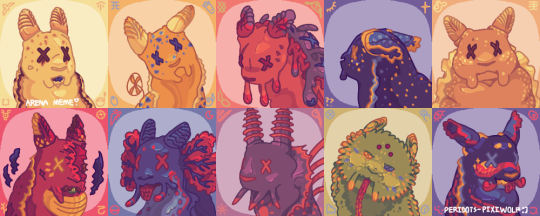
[Start ID. A redraw of the official icons of the ten named slugcats from Rain World, arranged in two rows: Survivor, Monk, Hunter, Nightcat, and Gourmand in the first, Artificer, Rivulet, Spearmaster, Saint and Enot/Inv in the second. Each is drawn in roughly the same pose as in the original art and fitted with speculative interpretations of their biology, and the second image is a “dead” version of this. For example, all ten have slug-like rhinophores in place of ears, cuttlefish-like colorful eyes with strangely-shaped pupils, cephalopod-like beak "teeth", expressive barbels or oral tentacles at the corners of mouths, spiny radulas, and the frilly mantle fringes of sea slugs, though otherwise their faces are squishy, simple and mammalian-shaped.
Cream-colored Survivor and yellow Monk both share triangular, bicolored spots matching their eyes (which are tan and brown, and two shades of blue, respectively), small, bumpy fringes, and relatively neutral looks on their faces. Defensive-looking Hunter is mostly a dull orange-pink, though their blobby fringe is a more violent red and their back is purple and marred with lumps. Nightcat is navy blue and flecked with dots of yellow and teal, their rolled rhinophores are a lighter blue, and their shading fractures into stars in some places. Gourmand is almost uniformly tan, their wide, very ruffly white mantle fringe bordered by a spray of white spots, and their beak sticks out from either corner of their smile. Primarily red Artificer, snarling, has yellow markings of multiple sorts, a prominent yellow dewlap and their characteristic dark scar taking out a chunk of its face. Rivulet is a darker blue than usual, with long barbels, red gills and rings, countershading, and a cheerful expression, sticking out their radula. Spearmaster is purple with orange accents, eyes and spots, a large fringe and spines down their back. Saint’s green caryophyllidia are marked by small, yellow diamonds, and their long, thin radula extends far below them. Enot is decorated with mottled red stripes, blue patches, yellow stars, and an uneven and almost cartoonish imitation of blush, though generally the same deep blue as Nightcat, a passive or almost slightly smug look on their face and their rolled rhinophores out to either side.
In the second image, nine of the slugcats’ eyes are crossed out, indicating that these are death icons. They look fairly the same, with mostly expression differences. Survivor is caught in the beginning of a threat display, a karma flower sprouts from Monk’s side, Hunter is burdened with overgrowing, purple and blue rot, Nightcat’s rhinophores are pinned back, and Gourmand looks mildly disheartened. For the final row, Artificer bites its radula between small plumes of smoke, Rivulet drops their expression, Spearmaster looks very startled, Saint looks almost entirely the same besides half-open eyes and their markings greater in number, and Enot grins confusedly. End ID]
If you'll excuse the unusually lengthy ID: the arena meme introduced by @pansear-doodles at long last after a nearly year-long wip status (or, rather, finished a month ago today to honor my own first time playing it!)
Design notes and shout-outs under cut! :]
The following people are some of those who’ve inspired my designs most since I started this eight months ago (or just inspired me to get a little weirder with slugcat biology), among many others for sure, and I thank them for it–but this is simply to bring attention to artists I find cool, and in no way an obligation to interact or anything :]
> @saturncoyote , @carpsoup , @charseraph , @gallusgalluss , @bitsbug , @dopscratch , and @0hmanit (and a special mention to dddeerbo and hunterlonglegs, who’ve since deactivated)!
Survivor: Surprisingly the hardest to pin down the colors for, since nothing with its sibling's palette seemed to match up right (I did have to add in a little blue somewhere for Monk, the beginning of making it clear how much I’m simply going based off of vibes for the colors of scug innards). I consider them, Monk and Gourmand to be part of the same gene pool of slugcats, and even possibly the same colony even if the latter isn't really related, so took a bit of Gourmand's coloring and fit them in with their inspiration: Goniobranchus verrieri. They serve as a bit of an introduction to my ideas of scug traits (i find it really fun how many people have thought to add so many silly sluglike fixtures of biology completely independent of me, buuut here I’m mostly talking about species variation), and like in-game they’re pretty average! They, Monk and Hunter have a couple scars sourced from a piece of Joar's concept art that I'm failing to find, those across the bridge of the nose, under the eyes, and across the rhinophores, respectively, and my Survivor interpretation features many on the back of the neck, as a result of survived lizard bites.
Monk: Their coloring is primarily based off the fact that I associate them with blue fruits, honestly, a bit because I was compelled to establish a familiarity with Rivulet, and lastly inspired by the spots of Goniobranchus kuniei (and geminus, less important to me as one of my characters is a kuniei instead, but more fitting). Between the yellow + blue and the circular marking in the center of their face, they’re meant to bear a little resemblance to an iterator that shares similarities with the characterization I’ve given them, and similar coding of her sibling can be seen on Survivor’s markings around the eyes. As both a “default” slugcat and one whose campaign I haven’t played, though, I can’t say I have much more to point out about em.
Hunter: The whole rot thing made for a really fun time drawing them, and while the color change on their back is a result of this, it’s also an excuse to relate them to Babakina festiva, arguably my favorite sea slug (mostly for sentimental purposes). And to Spearmaster, a fellow messenger slugcat, and it serves as a gradient between Hunter’s pink and the “traditional” color of Rot seen in the DLLs. Aside from their affliction, they’d actually be the plainest in terms of design, as they don’t have any patterns or quirks of body type, just the red + purple and strange lumps + possible malnutrition. I can’t remember if NSH had created them in particular or just...caught + released or something, but it probably wouldn’t be strange for a lab-grown slugcat to be simple like that.
Gourmand: Like the two above, they’re rather plain in terms of coloring and adaptation, and like the two above, I find that fun. I decided it would be nice to avert the “all slugcats being of the same body type, and Gourmand’s out of place as the exception” thing by just...adding more fat to all of them, really. I did want to emphasize their sheer bulk even so, both fat and muscular (not like I couldn’t have still gone further with it, of course, but slugcat anatomy can be a little obfuscating sometimes, and they were intended to look rather plush considering personal size headcanons and therefore the lack of proper gravity), and the thick and flounced mantle looked like a good addition, as per their sea slug Glossodoris hikuerensis. Unlike Survivor and Monk, I didn’t attempt to hold their resemblance to any particular other character (which means a little less to balance out the “default gene pool” thing), so those are all the design notes I have for em.
Artificer: The second slugcat I’ve ever played, or finished the campaign of, my favorite for at least a long time, and the first thing I did was give them yellow accents, the shape of which have troubled me slightly (not quite like the spots or stripes of the others). They’re both a little more appealing and more explosive-looking to me, and considering how early on I played Arti, actually present in some of my older art. It does give them a little resemblance to Saint (completely intentional, two slugcats with strange relations to karma), as well as the fact that its radula is green for familiarity with one of its children (at some point it was going to have all-green markings, even!). I’m generous with their scars, partly because it was fun to overemphasize the one on their face and partly because it does seem like a reckless slugcat, on top of the dangers of its explosive abilities–I’ll probably just keep adding more forever. Mostly-red sea slugs aren’t too common, but Hexabranchus sanguineus works for sure. The ridged, yellow dewlap can expand for combustion purposes, or something along those lines. Arti’s where I began experimenting with a lot of the mildly-offkilter features seen in my interpretation of slugcats, as they’ve once again been a favorite from the start.
Rivulet: I've obviously given other slugcats spots, deeply enjoy the bubbly-soda markings of other peoples' slugcats, and thought seal riv would be cute. Despite not too closely resembling it, they've been government-assigned Hypselodoris bennetti, for color reasons and for a couple sentimental ones. Originally, the colors of every scug were meant to match up with the custom colors I gave them at the beginning of their campaigns, (though Arti, Gourm and Spearmy are the only three who actually apply here, since I've only played through half the slugcats: I gave arti the yellow as mentioned above, gourm brown eyes and spearmy light pink spears, furthered by the outskirts pearl accompanying me and that palette all the way to moon. Tolerance training for eternity in hell cause I already knew about the maroon pearl quest). I initially gave them the colors of the bi flag for fun... but with the limited palette of this image, I was left without pink for a while and decided to see how they'd look in red. I then realized how they now wonderfully matched Moon, and besides, red's a sort of camouflage in deep water! As a side-note, the difference between their eyes and those of others always bothered me a little for anatomical purposes, and the cephalopod eyes were probably influenced by this!
Spearmaster: Inspired as much as possible by @notyourfunnyman ’s wonderful spearmy: designed in a way that helps it fit in with scavengers, at least between the long sensory tentacles, big ruff, back spines and slightly thin/distended anatomy, a form of defensive mimicry. I always had annulate rhinophores in mind, for a little diversity sure, but mostly because the shape reminds me of radio antennae and communication towers (seems fitting for the comms array and being a messenger slugcat)! I started searching for a real-life slug to give them just by looking up their rhinophore shape...and was met immediately and coincidentally with annulate-topped nudibranchs that fit them more perfectly than I could've imagined: Flabellina and surrounding clades, I think Paraflabellina ischitana works very nicely. The orange was completely unplanned, but there wasn’t a place for light pink among the other slugcats’ palettes, and importantly it likens them to both Hunter and Seven Red Suns a little more.
Saint: I am very much a non-furred slugcat enjoyer, with respect to those who aren’t, so figuring out the only visibly furred slugcat was an interesting challenge. I’ve decided that they likely have other, milder adaptations for help in the cold, mainly just more efficient fat storage, and what looks vaguely like fur is instead a bunch of tubercles (called caryophillia, for the second reminder out of three). Their inspiration doesn’t have these, however, Miamira sinuata’s numerous yellow and blue spots (not to mention...whatever’s going on with that shape) and general effect of being the only really green nudibranch I could find were probably perfect for a strange green echo. Not pictured, but their beak-teeth are tiny and flat to make a surface for grinding soft food against with the lack of a functioning radula, which is tipped with a specialized spiny “grapple-hook” for better traction/grip (not to mention the numerous little teeth running down the whole thing).
(Best part of hiding this under a readmore means edits will be seen by all reblogs, I'm mostly sure, because I completely forgot to mention! The spots on their forehead are simple eyes. Their camera eyes appear closed in-game, I like to believe their complex eyesight is rather poor anyways or otherwise reason that they aren't seeing out of those, and while this was far from her REASON for attunement with the world, it does help compensate for mainly viewing it through a canvas of simple light and dark. This, and the fact that their swapped-out "fur" is not only to commit to a lack of hairs but contributes to sensory input!)
Nightcat/Enot: I guess you could say I found the “these two are technically the same person” compelling. (E.g. similar colors, both very strange and enigmatic, and Enot/Inv/Sofanthiel’s remark during the dating sim about getting removed from Arena Mode.) I doubt they’re the only two slugcats in their body, considering humans with DID tend to have more than a few (and I find it very funny that a slugcat bearing resemblance to Nightcat appears in Gourmand’s ending. They’re allowed in the colony and Enot isn’t </3), and I have to credit @faelingdraws ’s art for being what convinced me on it! Their design inspirations come down to trying to balance a few different ideas: making the patterns and palettes of both look oddly similar (special mention to the stars, since those are fun to draw), basing them off of Felimare sechurana and juliae respectively, using blocks of color with the same placement as in Enot’s official art, and specifically making Enot look...biologically reasonable and imperfect, whilst also clearly trying to imitate human displays of emotion (what with...the eyes and blush on that one piece of official art).
Lastly, here’s just a lineup with notes on body shape and size. Most of the nicknames (existing to give a little more space, that’s all) are obvious, and while I can’t remember why I shortened Nightcat to Nox, it is in honor of my friend by the same nickname :]

#survivor rain world#monk rain world#hunter rain world#nightcat rain world#gourmand rain world#artificer rain world#rivulet rain world#spearmaster rain world#saint rain world#enot rain world#slugcat rain world#rain world#peridots-art#< feels like too long since that last tag's been used. i can say with certainty that the majority of the reason i haven't been just as#active here (not to mention not drawing as often since that's relevant) is just due to my life getting busier with a new school year but i#do miss putting my stuff here! and would like to reblog more on top of that.... so forgive not remembering exactly how to tag everything#(and how to write everything up there but to be fair it's not like long textposts were a staple of mine. i mostly just rambled and it was#fun hehehe.....some of those notes (parts of riv/spears mostly) were written around the beginning of the drawing itself)#OH i messed something up with the drafting and really did not mean to post it while tags were in progress! but regardless. i would've liked#to post it tomorrow to mirror how i was going to post it on JAN 29 a month ago......but it's not like i'm unhappy with this outcome :]#to sum it up really though it's been strange working on this for so long.....unfortunate to not get a chance to let it be seen and keep#experimenting with odd biology much earlier but i'm just glad it's out now cause i am proud of these!! it's been a lot of fun and slugcats#are still my go-to doodles :] if i had to end this off promptly though what's up with that secret pipeyard shelter as gourm that's not on#the maps. connected to vs_a04. doesn't appear on the miraheze or interactive maps for anyone strangely but i've only been there as gourmand#anyway! i'm sure there's a lot i could've said in the rush but goodbye dear reader anyway :]#i forgot spearmy initially. i'm so sorry#peridots-described#< NOOOO THAT DOESNT SHOW UP THERE'RE TOO MANY TAGSS.......
352 notes
·
View notes
Text

Illustration of a cemetery from World's Best Music – Helen Kendrik Johnson // the 1 – Taylor Swift // loml – Taylor Swift
#haha not me popping back in after days of nothing to just drop this 😅😅#so sorry y'all this was in my drafts for a while and i wanted to post something so ya'll would know i'm still here#i promise i'm working on everything i'm just slow 😭😭#cemetery#the 1#folklore#folklore taylor swift#folklore album#folklore ts#loml#loml taylor swift#the tortured poets department#ttpd#taylor swift#ts edit#tsedit#tswiftedit#tswiftlyrics#ts lyrics#tswift edits#tswift lyrics#art#art history#lyrics#lyric art#lyric parallels#lyrical parallels
161 notes
·
View notes
Text
The way Azirphale is underestimated and practically infantalized by heaven is so closely tied to his femininity and I think we should talk about it more because I just want to shout about how relatable the way he's treated in his workplace is as a woman working in a traditionally male field
It's in all the little niggling comments from your boss about personal things that hold no bearing on your work
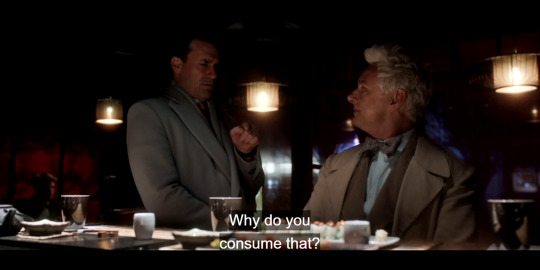
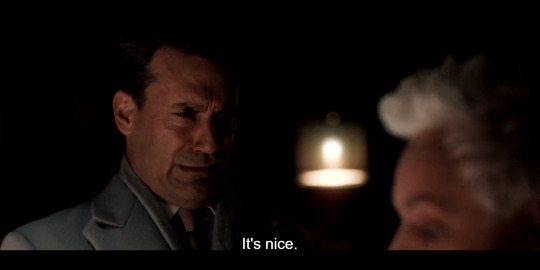
and the assumption that what you're doing must be simple if it was assigned to you
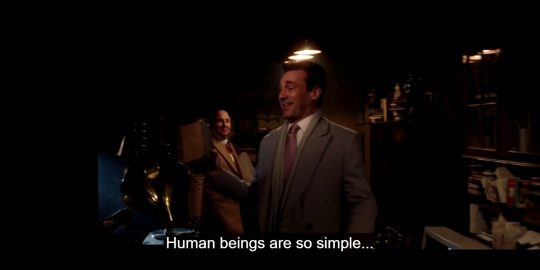

your work is trivialized
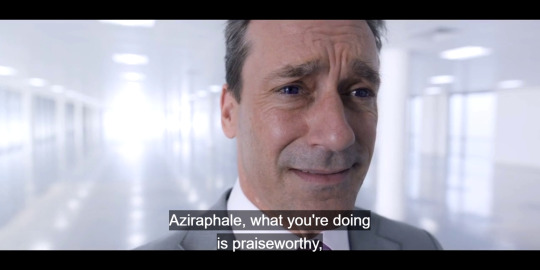
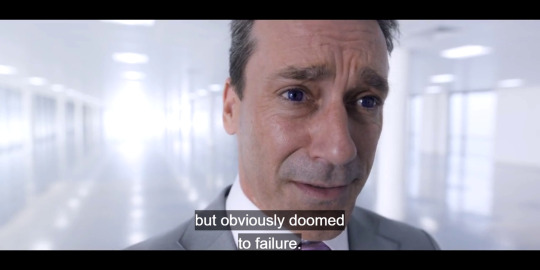
and you get these the placating smiles when you're told plans and proposals are rejected and passed over
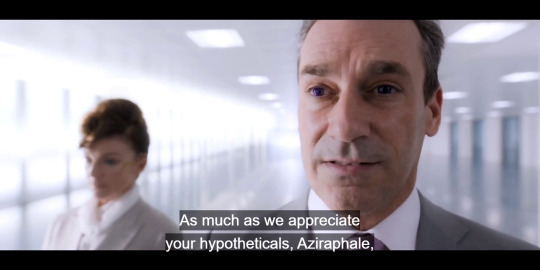
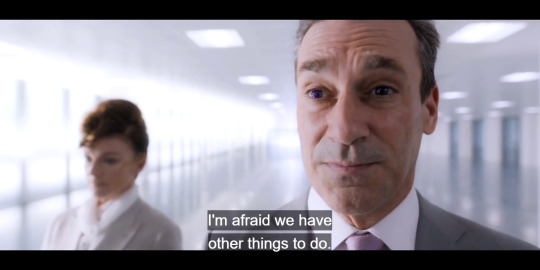
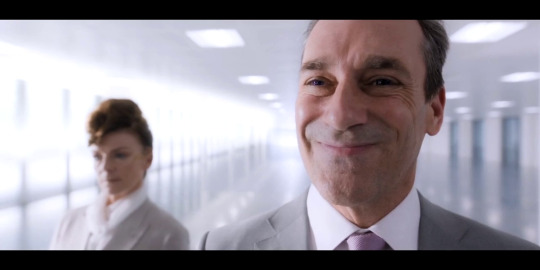
or when your complaints are dismissed

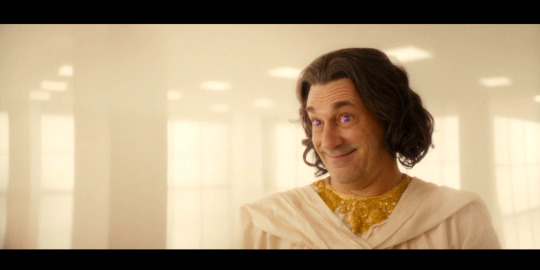
and you get more of the same from upper management
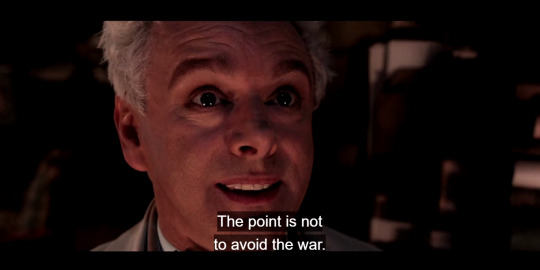
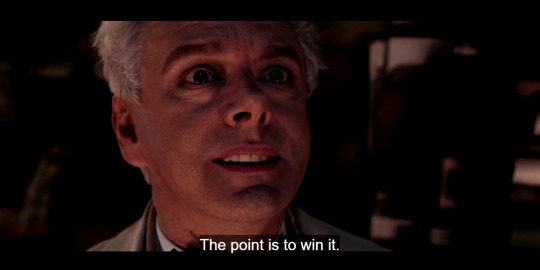
it all feels so frustrating and draining but you're at work so all you can do is take a breathe put on that mask and move on with your day
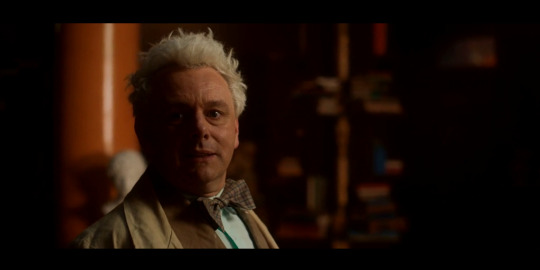
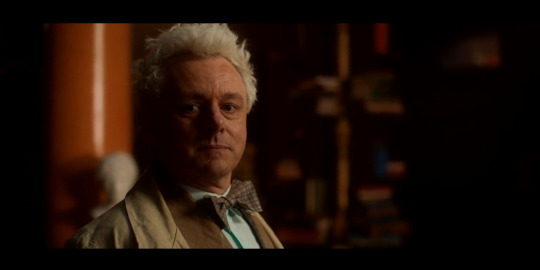
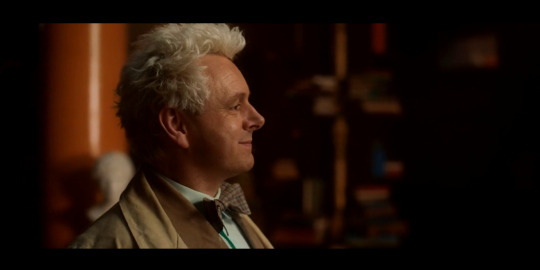
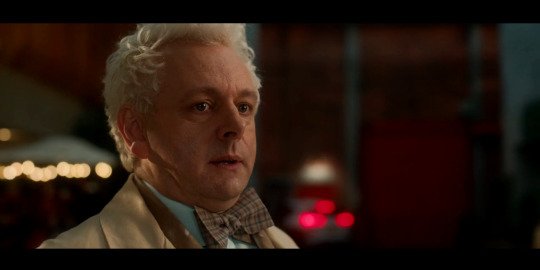
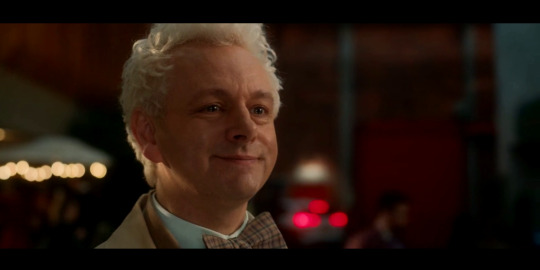
It is all so deteimental to your emotional well being and textually, so much of this is tied to Aziraphale's softness, his gayness - his femininity
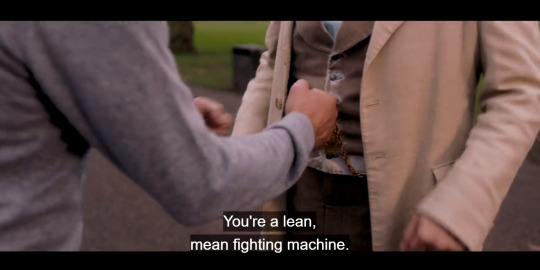
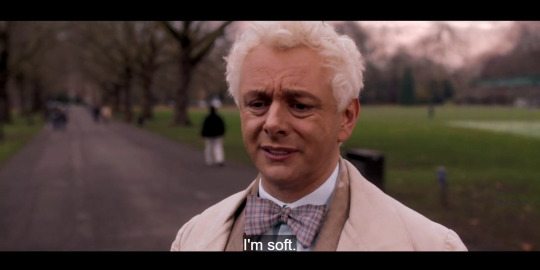
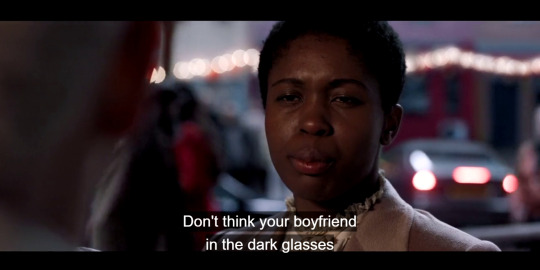
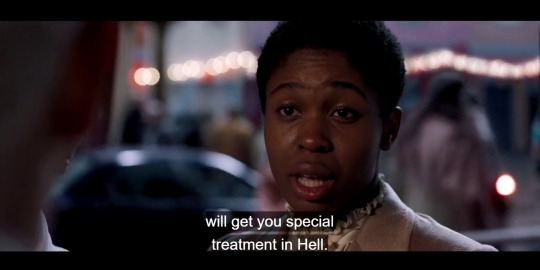
The thing about working in an environment and gives you this feeling - of being simultaneously destrought watching your belief in yourself get chipped away but also just so irate becuase you know you don't deserve it - is how it builds. It sinks under your skin and feeds into this indignant dejection until you can have a moment of release - but Azirphale doesn't get to bitch about it over drinks with friends, he doesn't get a lunch break where he can go for a walk and listen to an angry scandi death metal playlist, he doesn't even get the chance to cry about it in the bathroom for 5 minutes before confronting it again
(And I talked a little bit about it in the tags of this beautiful photoset but this all comes into play whenever Crowley dismisses his plans or calls him an idiot. These are purely emotional reactions; I really don't think Crowley means much by it - he respects Aziraphale's opinion and genuinely thinks he's brilliant - but Crowley is so quick to use this terminology when Aziraphale is making a decision Crowley thinks is wrong and he doesn't know how much this hurts Aziraphale. Just like Aziraphale doesn't understand the true impact the Fall had on Crowley, Crowley doesn't understand the ways heaven has been tearing away at Aziraphale's self worth)
Aziraphale has been facing this constant drip of denigration since before the beginning of time and has never released the pressure valve. At this point, he's a bomb waiting to go off
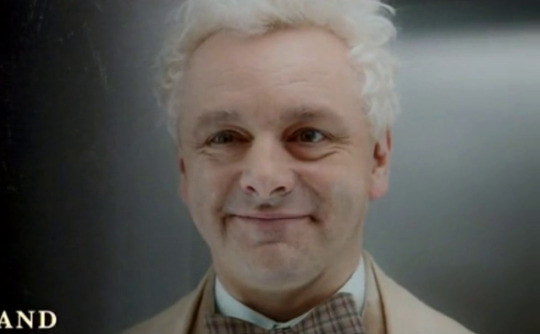
#(I want to note that I am coming at this from my personal experience as a woman#but I know femme neurodivergent and disabled folks of all genders face these same issues)#along similar lines I have tons of feelings about how often Aziraphale hides his hands when talking to other angels#to hide his stimming#and look I try not to tie everything back to explaning why Aziraphale ended s2 the way he did but apparently I can't#its just the juiciest character moment to me#also thinking about how angry Crowley was at Gabriel when he was treated like this once#granted shut up and die already IS the worst thing Gabriel has said to Aziraphale but if Crowley knew how much of this was going on...#aziraphale#good omens#go2 spoilers#good omens meta#Thanks to folks who responded to my tags on that post because you really motivated me to find these screen caps#and finish this post which has been sitting in my drafts for ages#also sorry so many of gabriels faces are funny I cant help that jon hamm is comedy gold - i refuse to let it undermine my point
1K notes
·
View notes
Text

A-in Goldenloin: This is my beautiful wife, Atenea. And this is our kinda ugly son, Ambrosius ✨✨
Hi! Here's some ideas for the headcanons I've got about Ambrosius' parents!
Under the cut is written stuff and a couple more of drawings :]
-(Btw, A-in jokes about Ambrosius being ugly as hell as a baby, but he's just bald. The rest of him is very pretty in her opinion 😭)
-Atenea Goldenlight was obviously famous from being a Gloreth's Descendant. She's tall, a knight, has long blond hair that flows with wind that comes from nowhere, and also has a twin brother (Amadeus), who's not a knight but has equally nice, physics-defying hair and tallness and Gloreth-ness (they're the Goldenlight Twins).
>Btw sort of based their design on this concept art of Ambrosius from early Nimona development by sangjunart.
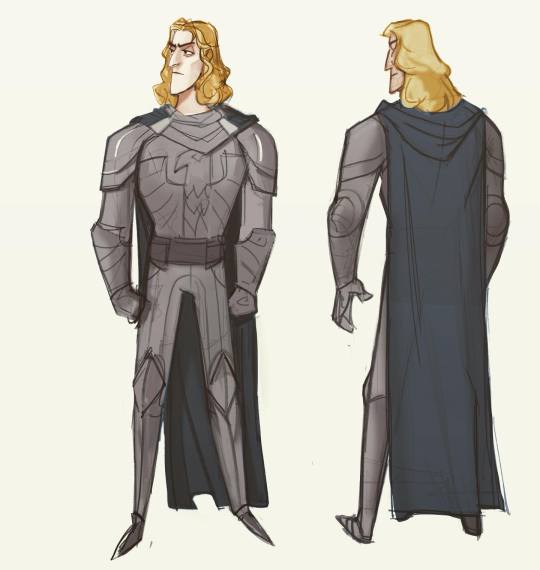
-A-in Moonloin was the daughter of someone important in business idk, and Atenea's father presented her to his son Amadeus in hopes of them clicking, and they just got along but A-in really liked his sister, so she started pursuing Atenea instead (Amadeus couldn't have cared less, since he wasn't interested in any romantic relationship to begin with and it's happy for both his sister and his new friend).
BRO LIKE THAT AUDIO OF this thingy, it's in Spanish and I don't know if it's available in English but it goes like this:
A-in: Do you like chicken? Amadeus: No. A-in: And curry? Amadeus: Neither. A-in: Then you won't like what I did. Amadeus: Chicken and curry? A-in: No, I banged your sister.
-Anyways when they marry and have to sign down their family name, both are like, hey, you know what would be really funny? And so they're the Goldenloins instead of the Moonlights.
>Alternatively, Gloreth's descendants' family names always start with Golden, nevermind if the other option was nicer, just to keep the majestic bit of their legacy (or because Gloreth's last name started with Golden-), but that's sadder and I don't like it, even if it makes more sense.
>Also if that were the case then Ambrosius would've liked to go against the family tradition and do Boldloin instead of Goldenheart with Ballister but Goldenheart is just prettier, and Ballister really wanted to share Ambrosius' last name too, and not for them both to just be Boldheart (bc it's cool to mesh together their names to make their family idk).
-The Goldenloins start gaining popularity, and Amadeus uses that as his chance to finally get out of the spotlight and goes:

>You're on your own now, sister (he's fed up of being part of the Goldenlight Twins thing).
-Neither woman had really been in an urge to have children, despite Atenea and her twin bro growing up with the 'Gloreth's legacy' stuff (meaning that they must continue it when they became adults). Atenea liked the life she led, and A-in enjoyed only worrying about work (bit of a workaholic) and her wifey (and family).
>But Atenea's father (Artemas) was insisting, since his daughter had already been married for years, that they gave them at least one descendant, since his son didn't seem to even have the intention of marrying or dating anyone that Artemas sent his way.
>And A-in's parents also were like, c'mon, when the kid? >:c and A-in was like, I'm just 27, you want me to have a teenage pregnancy? >:(
>Anyways, couple of years later they're convinced, and Atenea asks her bro if he's willing to be their sperm donor, and he's like YES WOO because he won't have to have any kids himself if his sister already gives their family a descendant.
>When he's told that A-in is pregnant he's very happy for them (but especially himself), very supportive and stuff.
-About names, since nearly every member in Atenea's family got a name starting with A, during a family dinner Amadeus says, wouldn't it be funny if you named your child with A too? since A-in got the A too.
>And then:
Atenea: We won't name them over such a silly thing, c'mon >:( A-in: Actually, I like the idea :) Atenea (folding immediately): Okay❤️yay❤️
>(Ambrosius' let's name our baby something with C so we're A, B and C, came from that bit of his family)
>And then they got the nicely meaningful name Ambrosia when they thought they were having a girl, then when the baby came out being a boy they were like, huh, Ambrosius it is then, I guess :/
-Ambrosius bald baby supremacy, also I like the idea of the dying his hair and all that that implies, of course, but also the idea of him just being born with the blond hair. In here it was more golden when he was a baby and started getting lighter with the years bc I fucked up and painted his hair too light already but I don't really want to change his color palette 😭
-Ambrosius often confused Atenea and Amadeus since they're twins, either was mama for a long time, until it finally settled in his brain that the shorter-haired mama was Uncle Amadeus.
>Amadeus cut his hair shorter just to say, short=Uncle and long=Mama, and then he ended up liking the hairstyle, so he kept it that way for a long time.
>Also they're fraternal twins but look nearly identical anyways shdjfhs for plot reasons


-Ambrosius is by no means over protected, by his parents at least, because the workers in their home definitely are overly careful with the baby, and then the toddler, and then the child, and so-on, because no one wants to find out what would happen if the youngest Gloreth Descendant got hurt.
>Both A-in and Atenea are overly chill about their son, knowing that the workers in their house do their best to take good care of him, but their parents are less forgiving and stuff, especially Artemas, with the whole Gloreth Descendant thing.
>Baby Ambrosius could be crawling and accidentally fall on his face, and both A-in and Atenea would burst out laughing, going, HAH the kid fell! while pointing at him (only if their baby is clearly not hurt), and since he sees that his mothers aren't getting scared nor worried, Ambrosius himself takes his falls with humor.
>But when he's with a servant, they'd definitely go D: and in turn scaring him and making him cry.
-Both A-in and Atenea are usually too busy, but they still try to make some time for Ambrosius or bring their work home so they can at least be near their baby. And sometimes they bring their baby to work because why not.
>Like there's Sir Goldenloin carrying in her arm a very small, blond and nearly bald baby, while talking with her team, or doing a photoshoot and there's Ambrosius somewhere being cooed at by the working team.
>Or there's Mrs. Goldenloin with a baby carrier on her and her baby's head resting on her chest as he sleeps, or shooshing people in the office when they're being too loud. Also, there's Ambrosius too being cooed at by her subordinates during lunch breaks.
-When Ambrosius' older, both of his moms get more responsibilities and have even less time, so now he doesn't get to see them much, until is night, and sometimes he's already asleep when they get home.
>But weekends are totally for him, so he's always looking forward to them.
>Then he enters the academy to be a knight and he sees them only on breaks and special occasions, and he misses them very much, especially because his classmates seem to not like him much, for whatever reason that he doesn't understand (Gloreth Descendant reasons), but then he gets closer to the new kid (Ballister) and since no one else seems to like Ballister either, they get along well.
>That thing is from a post I saw that explained it well but I cannot find it pipipi when I do, I'll link it here.
I've got a few more headcanons with Ambrosius being older and I want to make some drawings for it but I already lost interest in the matter for the time being sjdfkj so I'll leave it here!
(also wanna acknowledge the languages in the family and traditions and so many stuff but I've got no energy for that sdjfks like the tradition of korean babies choosing an object in front of them, like I imagine the Gloreth-side family hoping very very hard he crawls towards the tiny sword instead of the book or paint brush or the other stuff laid there djfkd I really gotta research how the tradition actually works bc I'm naming random objects sorry 😭) (In the other post I plan to make I'll talk about that pipipi)
Hopefully I'll make another post for the rest of headcanons, but that's it for now! :D
#nimona#ambrosius goldenloin#my art#Goldenloin family that I made up you're everything to me#Actually they were supposed to be neglectful parents#You know I did write a post with them being pretty neglectful but it made me really sad so I wrote this one instead djfkdfjd#I've redesigned them so many times#poor ladies#I'm not 100% happy with these designs either but they're good enough sdfjkdsf#just posting this because I have to work on other stuff and it won't let me work in peace if I know that the draft is just there djfkdfj#the clothes are from some concept art drawings from I can't remember which artist from Nimona#pipipi
65 notes
·
View notes
Text


4.08 ⋄ Lamia
#wh*re#*#merlin#emrys#4.08#im tired of keeping gifs in my drafts lmao im just gonna start posting everything idc
214 notes
·
View notes
Text

very normal, non-homosexual, things to call your rival
#ranpoe#bsd#i don't know why this one was in my drafts i don't know why i didn't just post it#it already had an id and everything. why do i do this to myself#hello grace here
420 notes
·
View notes
Note
Do you use AI generators to compile or scrape this information?
no
#anonymous#ai has nothing on an over-caffeinated human being copy pasting & taking screenshots past 3 in the morning & queuing everything#no but on a serious note most of these is the product of years of compilations stuck in my drafts & old files as a student#been going through my old bookmarks as well (bc need more space) so there may be random study notes or tips sometimes#thats also why i have a lot of grammar related stuff that i used at school --- still handy notes though#as for the requests i usually do them in one sitting & queue them -- not claiming to be an expert on those topics#i just try to look for the best sources i can -- which is fun bc i learn a lot as well &#i always appreciate when people send me more info or corrections#this genuinely made me a bit self conscious of my posts tho like do they look AI generated#just shoved a lot of queued posts back to my drafts lol will try to edit them better soon i know its a mess here !#also acccidentally clicking the 'shuffle' queue messed up the chronology at one point -- so been trying to schedule posts#instead of adding to queue ---- but will reorganise when i find more time#but yeah most of these are my literal notes -- excerpts / literally copy pasted from my references that may be quite outdated#that i need to delete but still wanted to save elsewhere
63 notes
·
View notes
Text
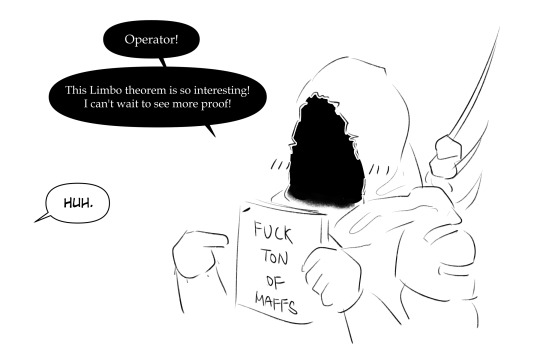
sometimes its weird to think of ordis as ordan karris
#ramble time#i think im in some kind of art block#again#i guess it just happens every now and then#i have like 3 drafts and i don't wanna finish any of them#idk#i drew someone else's oc yesterday and that's probably the only thing that piqued my interest enough to make me spend effort on something#but im too cowardly to ask if they would allow me to put that in my blog with ref so fuck it#or just show my art to them in general#ykw the only reason i can put anything on here is because i am effectively talking to air when i post so i have less mental burden or shame#whatever#i talk too much#this ramble is supposed to go to plurk but i guess i can't stop rambling about everything when im writing tags#warframe#warframe ordan karris#my art
78 notes
·
View notes
Text
#i think 900 was my worst 🙈#i just put things there where i’m like oooh! something i want to say something about later#and then i never do#or things i never got the confidence to post#or which i want to be able find easily later#but which then just get lost amidst everything else and way harder to find than if i’d just reblogged it#anyway yeah#i’ve been slowly working through them and whittling the number down#but it’s got me curious as to whether anyone else has similar struggles#or just generally what people’s relationships with tumblr drafts is#(these are the thoughts my brain has at 2am when i cant sleep)#polls#tumblr drafts#tumblr#lulu posts
121 notes
·
View notes
Text
at one point i didn't like caduceus' epilogue, that he just stayed home for a long time and eventually travelled again and eventually calliope joined him too. but i think actually i love it. something so gentle about him returning home to a temple that was once empty and lonely but is now healing and full of family who he loves so much. and to not have anything particularly asked of him apart from tending the garden and his small routines. especially thinking about how tired and sad he is by the end of the campaign, compared to the beginning when hes so giddy to just be interacting with people and seeing things he's never seen before and to have guidance from the wildmother. and then later, after aeor and so many more horrible things have happened, he admits to calliope that its too much and the outside world is scary and big and he's so so tired and he keeps saying how tired he is. so basically ideal ending that he gets to go home and get better and heal enough to be excited when he heads out into the world again
#another one from the drafts. look at my good post boy#kiddo say#tbf i was also surrounded by other fandom people at the time who were super into the idea that his family was toxic#and like suffocating him and bad for him . so that mightve been why it felt bad at first but idk how much *i* actually thought That#probably not much. more like i was disappointed his epilogue was so simple and short . but like thats the correct vibe isnt it#like yea so true. of course . everything cad does is simple and good and looking out for his friends and family -#ok i tricked you this was just evidence that caaduceus is disabled and a spoonie he needed to go home to rest and regain his spoons before#he can go to the fantasy dnd supermarket again#ur brave king i believe in u you fought hivemind god you can fight the fluorescents in big tesco#(also once again western standards of thinking everyone needs to leave home blehbleh but ive talked abt that before)
142 notes
·
View notes
Text
alternate universe shameless but it's about the milkovich family. they dont tone down terry, he's a nazi and a child molester. they show you all the trauma those siblings went through.
but they also show you when mandy, age 5, came home with a bruised knee, colin and iggy tracked down who pushed her at school and made his face bleed. or when mickey always made sure to block her door when he knew terry would be black out drunk, sadly he wasnt always there to protect her. or when their mother left and mandy started to cook so her brothers would be cared for. they show you the love bubble the siblings had to create in order to survive in this household. they also show you the awful coping mechanisms, the violence, the ptsd.
when did they all realize their life was fucked? when did they stop trying at school? mickey is shown to be quick with maths and he is also an artist and they never show that part of him. maybe one of them played an instrument (garage punk band era anyone?) but eventually had to stop to keep up with terry's shady activities. perhaps jamie and mickey knew they were both gay but never actually dared talk about it, but then on their wedding day jamie made sure all the guests were properly guided to the venue.
#shameless#milkoviches#gallavich spin off sure i want that#how about a milkovich show#the milkoviches are everything to me#mickey's character development is one of the best ive seen on anything#it's up there with carol from twd. cordelia. jamie lannister. chandler bing#not posting too much late spoilers because i know two of you arent there yet#just saw my queue spit out the lil baby mickey post#ive got a iggy post in my draft#the stars aligned on white trash today
89 notes
·
View notes
Text
girlies post incoming!!! 💜🍊
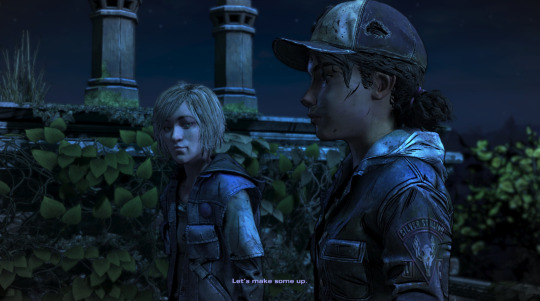
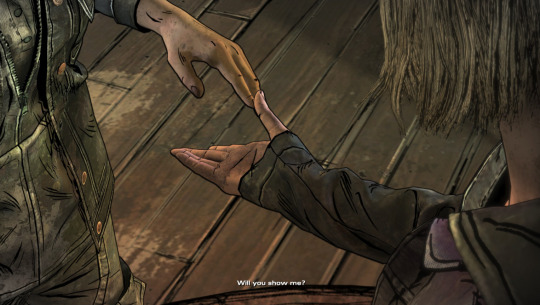
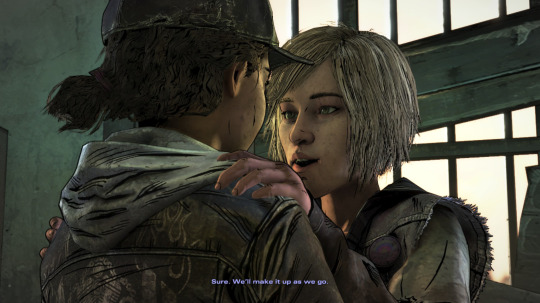
the way these two had no idea what they were doing (clem raising aj. violet leading the school) yet now they support each other and as a team are trying to help each other figure it out together. theyre making it up as they go but they at least know they have each other to rely on for whatever happens next
clem never had all the answers but she was trying her best to not let that show. violet becomes someone clem knows she can rely on no matter what (standing up for her and aj and their place at the school, "when i heard you call for help i didnt even think"), and clem becomes someone violet can rely on in turn (using her experience to help violet lead and protect the school and helping her take care of all these kids). theyre each others ROCKS!!!!!!! THEYRE A TEAM!!!!!!!!!!
honestly one of the reasons letting vi get taken hurts so much is that no matter what she WAS the leader of ericson!! vi (the wallflower that she was) steps up as soon as aj is in trouble to protect him And clem, then continues to fall into that leadership position because its not like anyone else is trying to keep everyone together. and even though she has no idea what shes doing or going to do about the army coming to take them all away, shes still trying her best, and clem helps her figure it out as they begin to lead together as a TEAM!! neither of them would be where they are without the influence of the other (vi stepping up as leader, clem being allowed back in). and you can just..... let her be taken in spite of all that.......... no wonder she was so heartbroken in that cell how could she not be
but if you save her it just solidifies their building relationship. that theyll always have the others back no matter what. and vi solidifies this even further by shooting minnie to save clem. all the little reassuring smiles they give each other.. making sure the other is holding up ok in moments of stress... im gonna go cry now
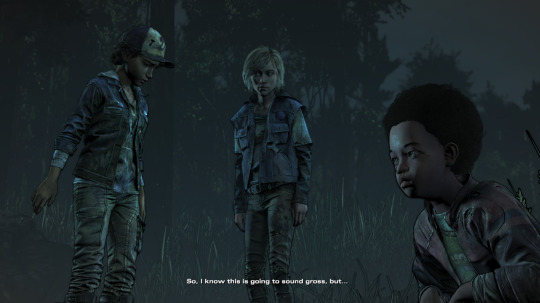
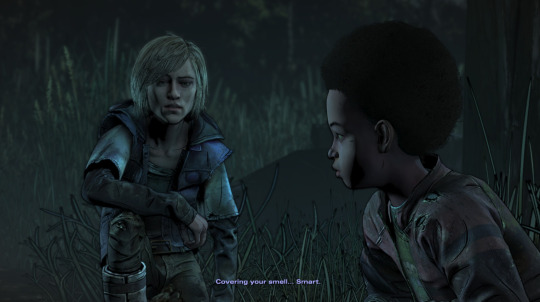
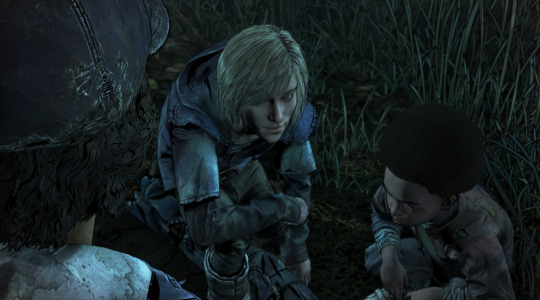
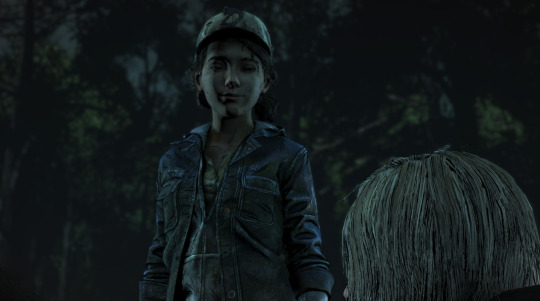
#THEY ARE EVERYTHING!!!!#vi shooting minnie to save clem just feels like such a great payoff to the culmination of their relationship LIKE MY GOD#and then after that theyre Especially mushy and gross with each other :) much more openly and confidently :) THATS GROWTH#twdg#violentine#it speaks#usually these posts stay in my drafts but i want to yell about my girls these lines make me feel things theyre such a team 😭#if i dont write my silly little essays about my silly medias i'll explode#2:30 on a wednesday. post it#played ep 3 last night and had lots of feelings about them#they gave clem a real partner bro 😭 i'll never stop being grateful for how wrong i was about clem romance they fuckin nailed it
163 notes
·
View notes